My Educational and Professional Journey
VerifiedAdded on 2019/12/28
|22
|6825
|159
Essay
AI Summary
The assignment content describes the education, work experience, skills, and personal qualities of an individual. The education section mentions primary school in Romania (1988), high school with an economy qualification (1990-1993), and a BTEC Level 5 HND in Health and Social Care from Icon College (2017-2019). The work experience includes various roles such as school kitchen assistant, child care, housekeeper, elderly carer, and teacher assistant. Additionally, the individual has skills in computer skills, English language proficiency, and string organization. Their personal qualities include empathy with children, good interpersonal ability, enthusiasm, and friendliness.
Contribute Materials
Your contribution can guide someone’s learning journey. Share your
documents today.
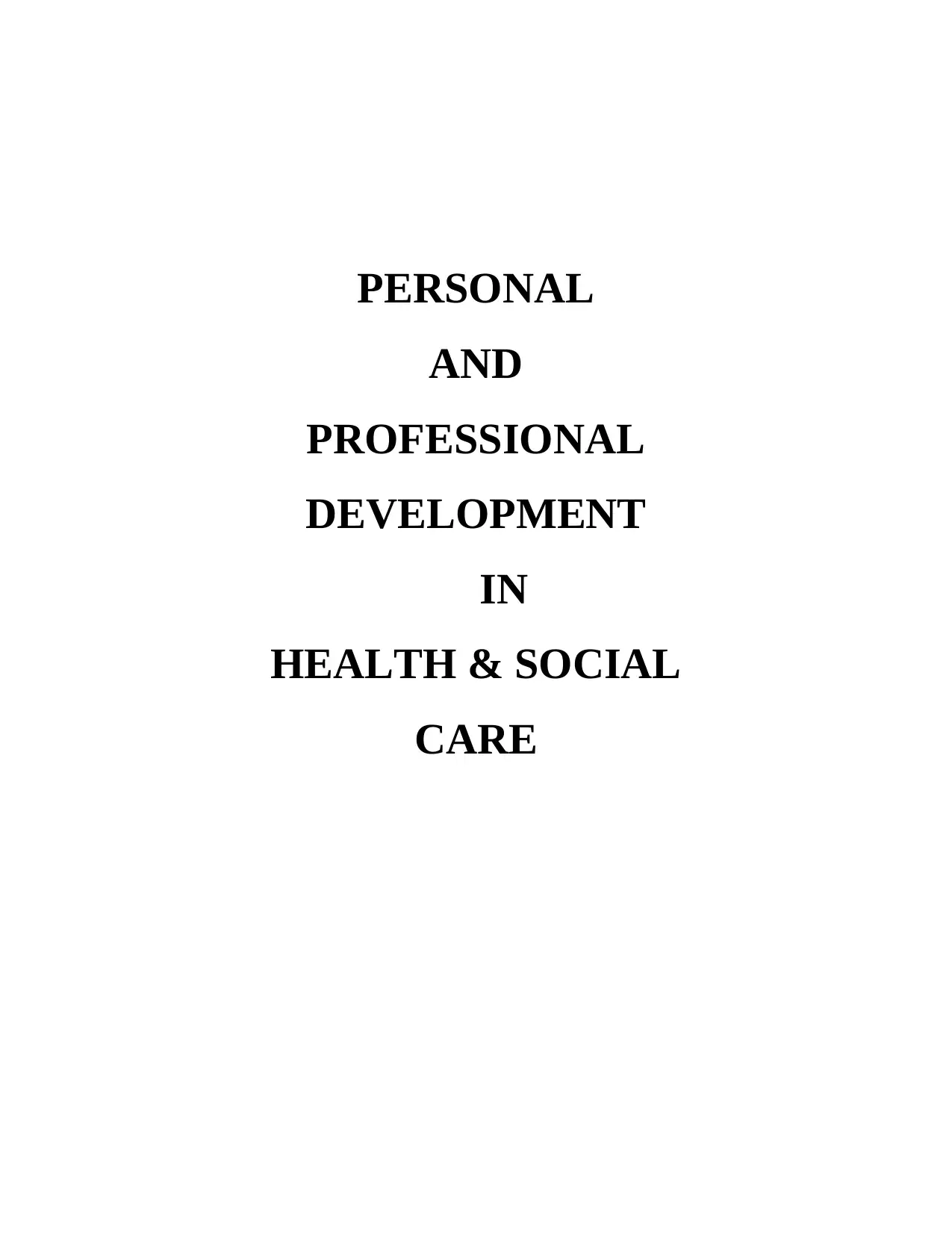
PERSONAL
AND
PROFESSIONAL
DEVELOPMENT
IN
HEALTH & SOCIAL
CARE
AND
PROFESSIONAL
DEVELOPMENT
IN
HEALTH & SOCIAL
CARE
Secure Best Marks with AI Grader
Need help grading? Try our AI Grader for instant feedback on your assignments.
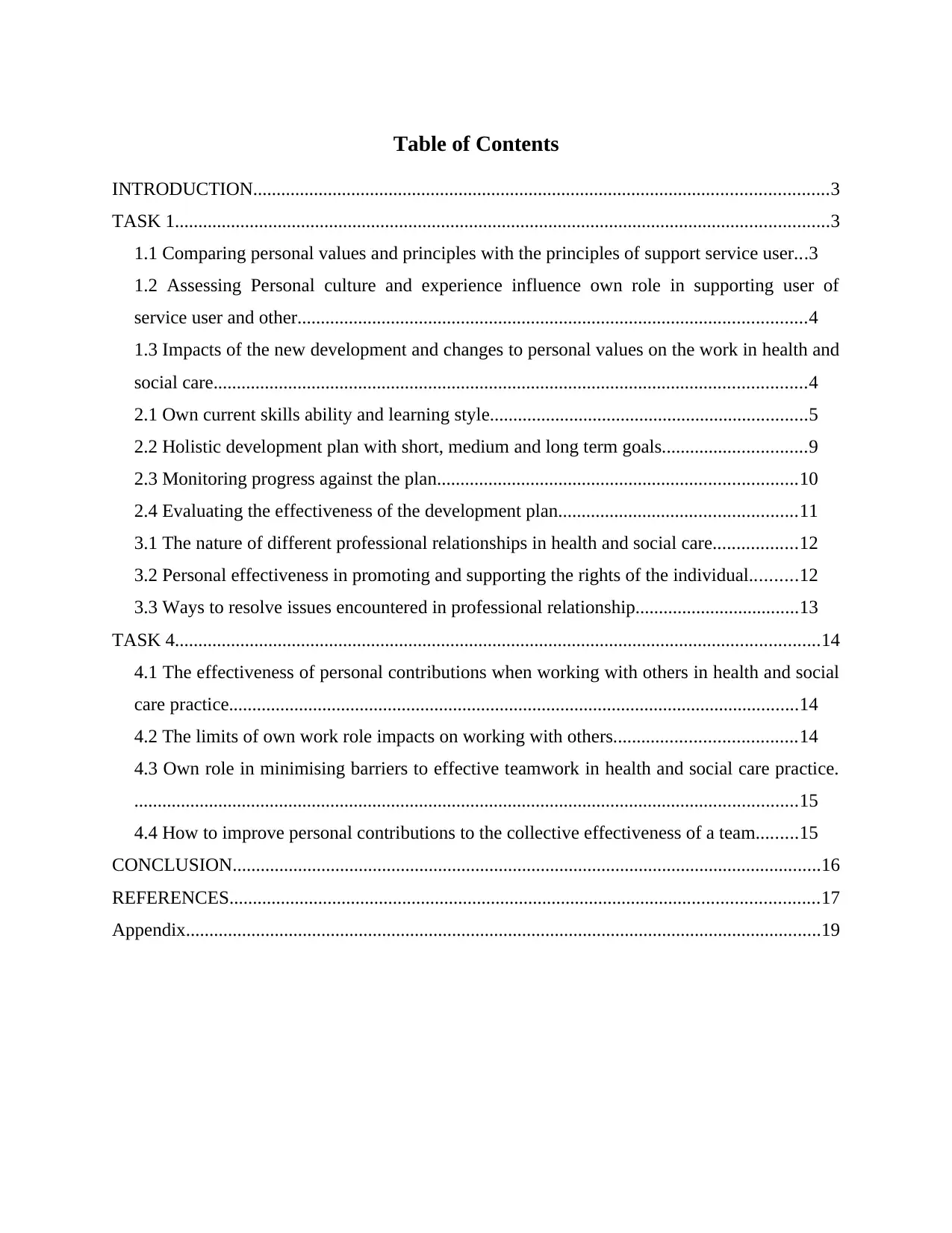
Table of Contents
INTRODUCTION...........................................................................................................................3
TASK 1............................................................................................................................................3
1.1 Comparing personal values and principles with the principles of support service user...3
1.2 Assessing Personal culture and experience influence own role in supporting user of
service user and other.............................................................................................................4
1.3 Impacts of the new development and changes to personal values on the work in health and
social care...............................................................................................................................4
2.1 Own current skills ability and learning style....................................................................5
2.2 Holistic development plan with short, medium and long term goals...............................9
2.3 Monitoring progress against the plan.............................................................................10
2.4 Evaluating the effectiveness of the development plan...................................................11
3.1 The nature of different professional relationships in health and social care..................12
3.2 Personal effectiveness in promoting and supporting the rights of the individual..........12
3.3 Ways to resolve issues encountered in professional relationship...................................13
TASK 4..........................................................................................................................................14
4.1 The effectiveness of personal contributions when working with others in health and social
care practice..........................................................................................................................14
4.2 The limits of own work role impacts on working with others.......................................14
4.3 Own role in minimising barriers to effective teamwork in health and social care practice.
..............................................................................................................................................15
4.4 How to improve personal contributions to the collective effectiveness of a team.........15
CONCLUSION..............................................................................................................................16
REFERENCES..............................................................................................................................17
Appendix........................................................................................................................................19
INTRODUCTION...........................................................................................................................3
TASK 1............................................................................................................................................3
1.1 Comparing personal values and principles with the principles of support service user...3
1.2 Assessing Personal culture and experience influence own role in supporting user of
service user and other.............................................................................................................4
1.3 Impacts of the new development and changes to personal values on the work in health and
social care...............................................................................................................................4
2.1 Own current skills ability and learning style....................................................................5
2.2 Holistic development plan with short, medium and long term goals...............................9
2.3 Monitoring progress against the plan.............................................................................10
2.4 Evaluating the effectiveness of the development plan...................................................11
3.1 The nature of different professional relationships in health and social care..................12
3.2 Personal effectiveness in promoting and supporting the rights of the individual..........12
3.3 Ways to resolve issues encountered in professional relationship...................................13
TASK 4..........................................................................................................................................14
4.1 The effectiveness of personal contributions when working with others in health and social
care practice..........................................................................................................................14
4.2 The limits of own work role impacts on working with others.......................................14
4.3 Own role in minimising barriers to effective teamwork in health and social care practice.
..............................................................................................................................................15
4.4 How to improve personal contributions to the collective effectiveness of a team.........15
CONCLUSION..............................................................................................................................16
REFERENCES..............................................................................................................................17
Appendix........................................................................................................................................19
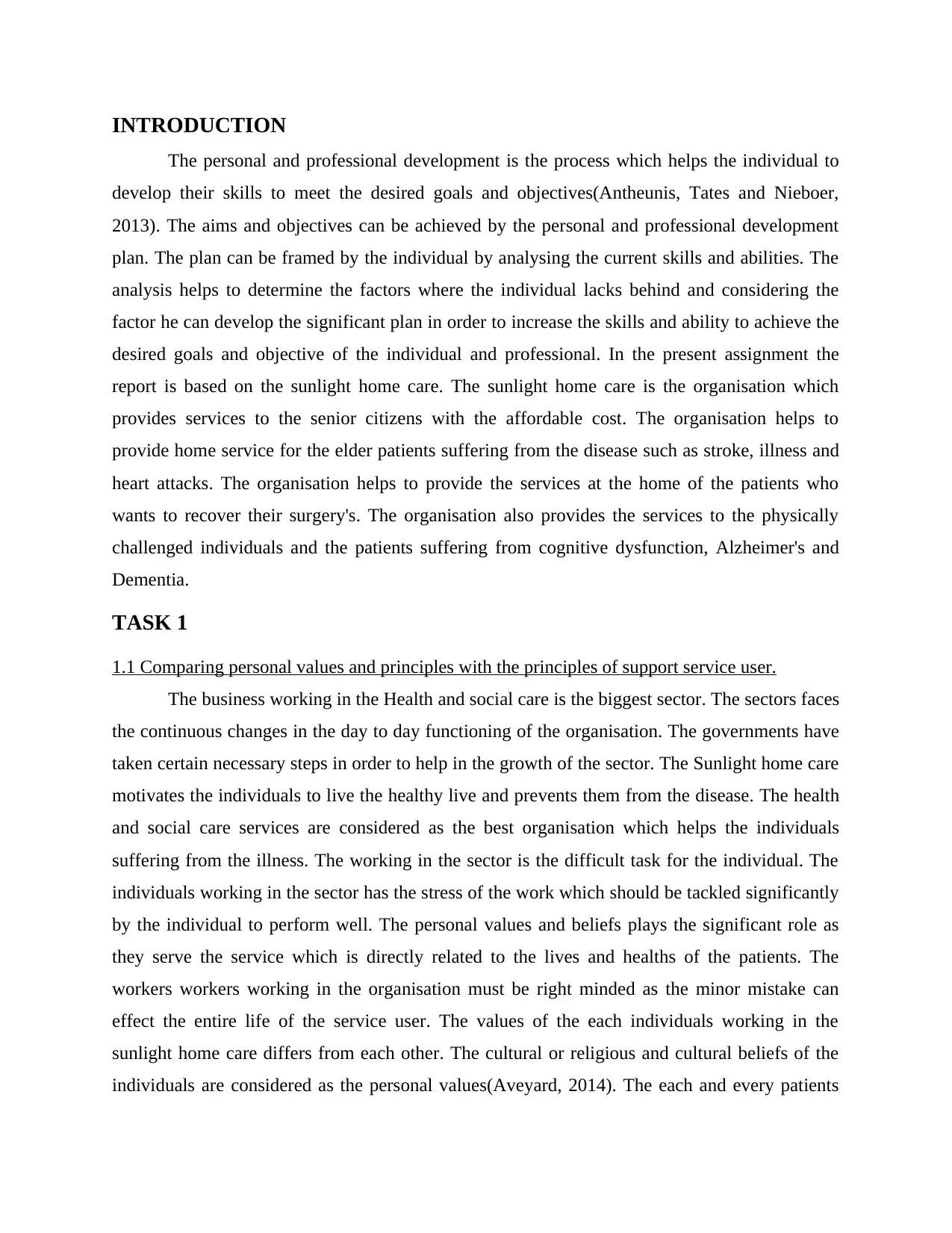
INTRODUCTION
The personal and professional development is the process which helps the individual to
develop their skills to meet the desired goals and objectives(Antheunis, Tates and Nieboer,
2013). The aims and objectives can be achieved by the personal and professional development
plan. The plan can be framed by the individual by analysing the current skills and abilities. The
analysis helps to determine the factors where the individual lacks behind and considering the
factor he can develop the significant plan in order to increase the skills and ability to achieve the
desired goals and objective of the individual and professional. In the present assignment the
report is based on the sunlight home care. The sunlight home care is the organisation which
provides services to the senior citizens with the affordable cost. The organisation helps to
provide home service for the elder patients suffering from the disease such as stroke, illness and
heart attacks. The organisation helps to provide the services at the home of the patients who
wants to recover their surgery's. The organisation also provides the services to the physically
challenged individuals and the patients suffering from cognitive dysfunction, Alzheimer's and
Dementia.
TASK 1
1.1 Comparing personal values and principles with the principles of support service user.
The business working in the Health and social care is the biggest sector. The sectors faces
the continuous changes in the day to day functioning of the organisation. The governments have
taken certain necessary steps in order to help in the growth of the sector. The Sunlight home care
motivates the individuals to live the healthy live and prevents them from the disease. The health
and social care services are considered as the best organisation which helps the individuals
suffering from the illness. The working in the sector is the difficult task for the individual. The
individuals working in the sector has the stress of the work which should be tackled significantly
by the individual to perform well. The personal values and beliefs plays the significant role as
they serve the service which is directly related to the lives and healths of the patients. The
workers workers working in the organisation must be right minded as the minor mistake can
effect the entire life of the service user. The values of the each individuals working in the
sunlight home care differs from each other. The cultural or religious and cultural beliefs of the
individuals are considered as the personal values(Aveyard, 2014). The each and every patients
The personal and professional development is the process which helps the individual to
develop their skills to meet the desired goals and objectives(Antheunis, Tates and Nieboer,
2013). The aims and objectives can be achieved by the personal and professional development
plan. The plan can be framed by the individual by analysing the current skills and abilities. The
analysis helps to determine the factors where the individual lacks behind and considering the
factor he can develop the significant plan in order to increase the skills and ability to achieve the
desired goals and objective of the individual and professional. In the present assignment the
report is based on the sunlight home care. The sunlight home care is the organisation which
provides services to the senior citizens with the affordable cost. The organisation helps to
provide home service for the elder patients suffering from the disease such as stroke, illness and
heart attacks. The organisation helps to provide the services at the home of the patients who
wants to recover their surgery's. The organisation also provides the services to the physically
challenged individuals and the patients suffering from cognitive dysfunction, Alzheimer's and
Dementia.
TASK 1
1.1 Comparing personal values and principles with the principles of support service user.
The business working in the Health and social care is the biggest sector. The sectors faces
the continuous changes in the day to day functioning of the organisation. The governments have
taken certain necessary steps in order to help in the growth of the sector. The Sunlight home care
motivates the individuals to live the healthy live and prevents them from the disease. The health
and social care services are considered as the best organisation which helps the individuals
suffering from the illness. The working in the sector is the difficult task for the individual. The
individuals working in the sector has the stress of the work which should be tackled significantly
by the individual to perform well. The personal values and beliefs plays the significant role as
they serve the service which is directly related to the lives and healths of the patients. The
workers workers working in the organisation must be right minded as the minor mistake can
effect the entire life of the service user. The values of the each individuals working in the
sunlight home care differs from each other. The cultural or religious and cultural beliefs of the
individuals are considered as the personal values(Aveyard, 2014). The each and every patients
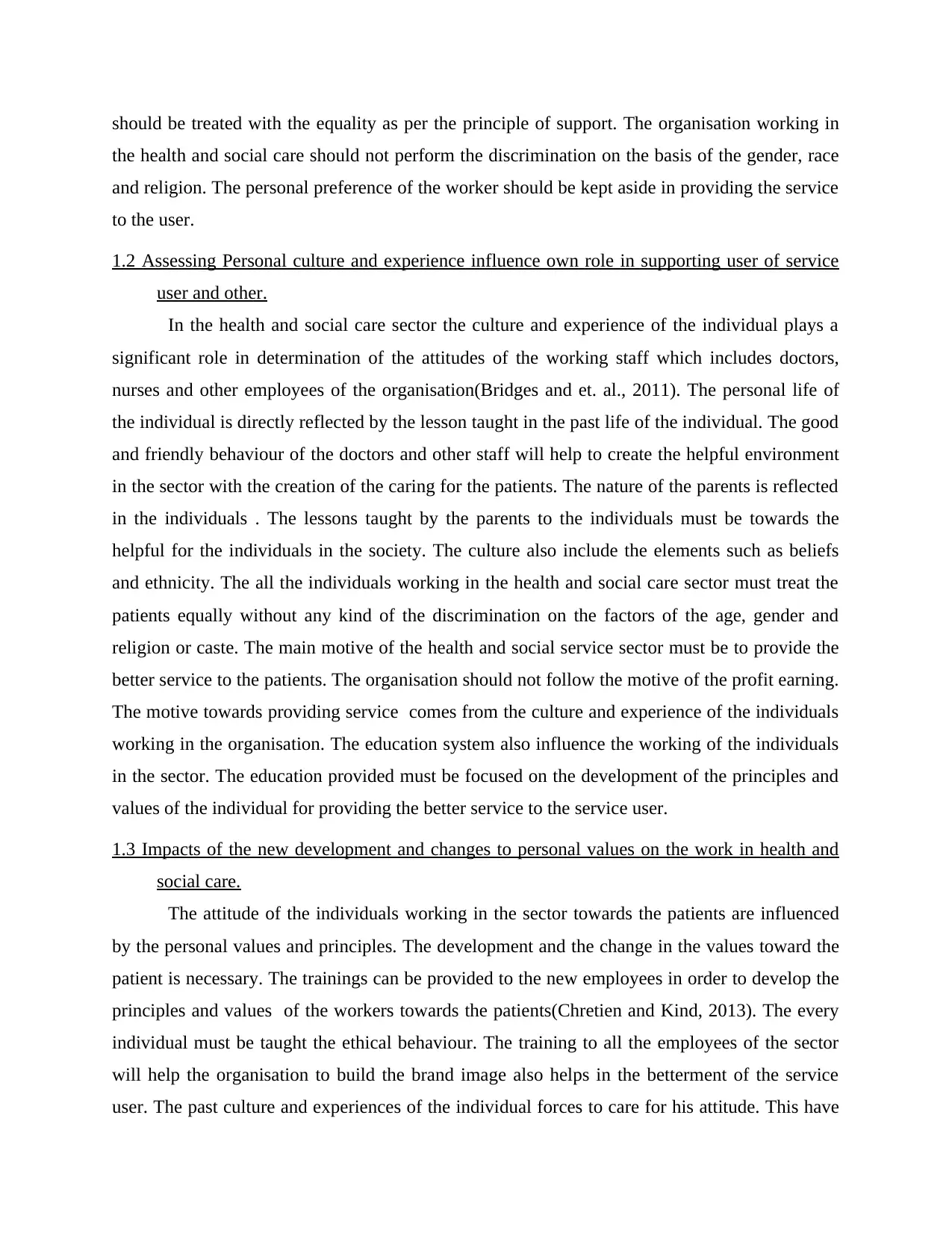
should be treated with the equality as per the principle of support. The organisation working in
the health and social care should not perform the discrimination on the basis of the gender, race
and religion. The personal preference of the worker should be kept aside in providing the service
to the user.
1.2 Assessing Personal culture and experience influence own role in supporting user of service
user and other.
In the health and social care sector the culture and experience of the individual plays a
significant role in determination of the attitudes of the working staff which includes doctors,
nurses and other employees of the organisation(Bridges and et. al., 2011). The personal life of
the individual is directly reflected by the lesson taught in the past life of the individual. The good
and friendly behaviour of the doctors and other staff will help to create the helpful environment
in the sector with the creation of the caring for the patients. The nature of the parents is reflected
in the individuals . The lessons taught by the parents to the individuals must be towards the
helpful for the individuals in the society. The culture also include the elements such as beliefs
and ethnicity. The all the individuals working in the health and social care sector must treat the
patients equally without any kind of the discrimination on the factors of the age, gender and
religion or caste. The main motive of the health and social service sector must be to provide the
better service to the patients. The organisation should not follow the motive of the profit earning.
The motive towards providing service comes from the culture and experience of the individuals
working in the organisation. The education system also influence the working of the individuals
in the sector. The education provided must be focused on the development of the principles and
values of the individual for providing the better service to the service user.
1.3 Impacts of the new development and changes to personal values on the work in health and
social care.
The attitude of the individuals working in the sector towards the patients are influenced
by the personal values and principles. The development and the change in the values toward the
patient is necessary. The trainings can be provided to the new employees in order to develop the
principles and values of the workers towards the patients(Chretien and Kind, 2013). The every
individual must be taught the ethical behaviour. The training to all the employees of the sector
will help the organisation to build the brand image also helps in the betterment of the service
user. The past culture and experiences of the individual forces to care for his attitude. This have
the health and social care should not perform the discrimination on the basis of the gender, race
and religion. The personal preference of the worker should be kept aside in providing the service
to the user.
1.2 Assessing Personal culture and experience influence own role in supporting user of service
user and other.
In the health and social care sector the culture and experience of the individual plays a
significant role in determination of the attitudes of the working staff which includes doctors,
nurses and other employees of the organisation(Bridges and et. al., 2011). The personal life of
the individual is directly reflected by the lesson taught in the past life of the individual. The good
and friendly behaviour of the doctors and other staff will help to create the helpful environment
in the sector with the creation of the caring for the patients. The nature of the parents is reflected
in the individuals . The lessons taught by the parents to the individuals must be towards the
helpful for the individuals in the society. The culture also include the elements such as beliefs
and ethnicity. The all the individuals working in the health and social care sector must treat the
patients equally without any kind of the discrimination on the factors of the age, gender and
religion or caste. The main motive of the health and social service sector must be to provide the
better service to the patients. The organisation should not follow the motive of the profit earning.
The motive towards providing service comes from the culture and experience of the individuals
working in the organisation. The education system also influence the working of the individuals
in the sector. The education provided must be focused on the development of the principles and
values of the individual for providing the better service to the service user.
1.3 Impacts of the new development and changes to personal values on the work in health and
social care.
The attitude of the individuals working in the sector towards the patients are influenced
by the personal values and principles. The development and the change in the values toward the
patient is necessary. The trainings can be provided to the new employees in order to develop the
principles and values of the workers towards the patients(Chretien and Kind, 2013). The every
individual must be taught the ethical behaviour. The training to all the employees of the sector
will help the organisation to build the brand image also helps in the betterment of the service
user. The past culture and experiences of the individual forces to care for his attitude. This have
Secure Best Marks with AI Grader
Need help grading? Try our AI Grader for instant feedback on your assignments.
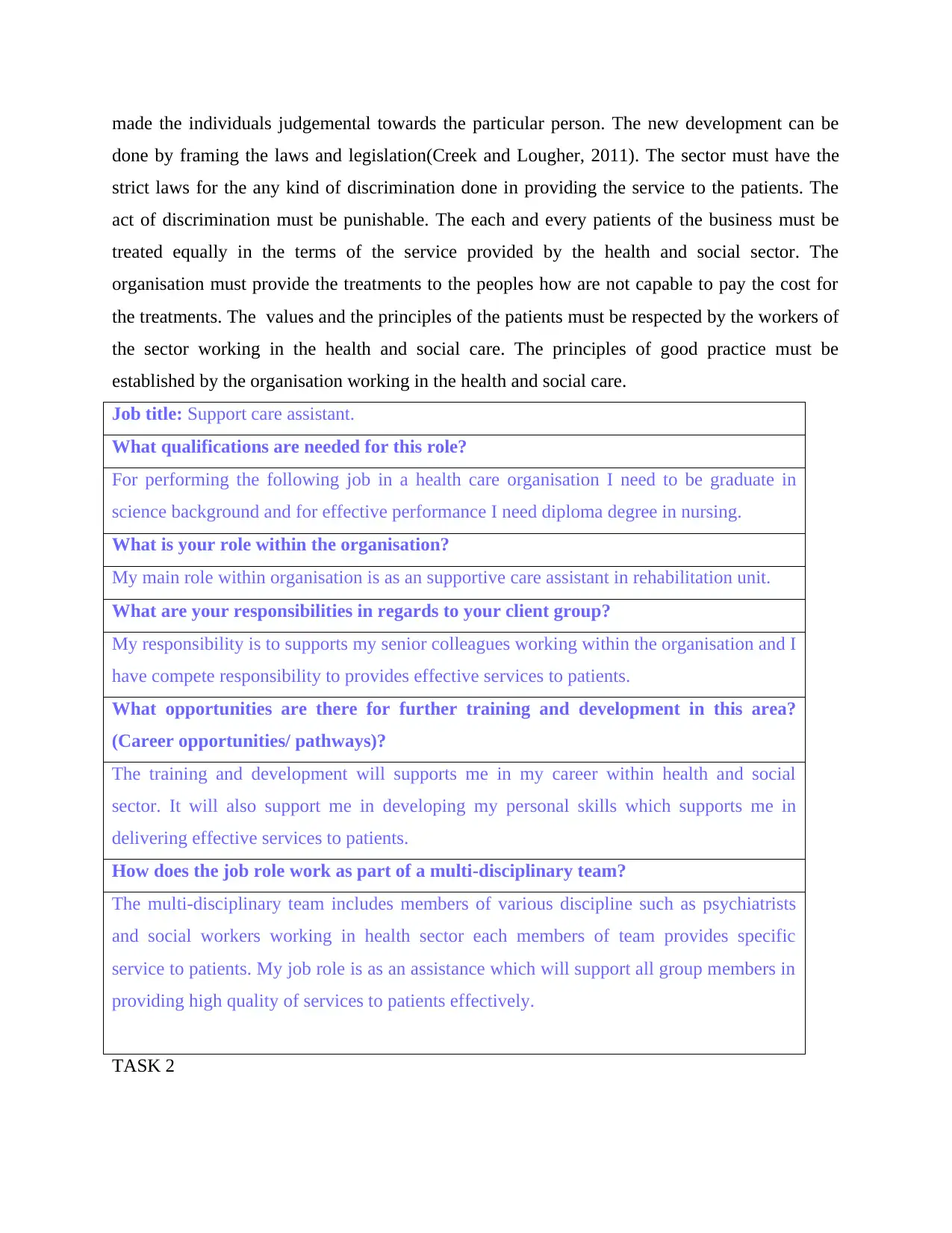
made the individuals judgemental towards the particular person. The new development can be
done by framing the laws and legislation(Creek and Lougher, 2011). The sector must have the
strict laws for the any kind of discrimination done in providing the service to the patients. The
act of discrimination must be punishable. The each and every patients of the business must be
treated equally in the terms of the service provided by the health and social sector. The
organisation must provide the treatments to the peoples how are not capable to pay the cost for
the treatments. The values and the principles of the patients must be respected by the workers of
the sector working in the health and social care. The principles of good practice must be
established by the organisation working in the health and social care.
Job title: Support care assistant.
What qualifications are needed for this role?
For performing the following job in a health care organisation I need to be graduate in
science background and for effective performance I need diploma degree in nursing.
What is your role within the organisation?
My main role within organisation is as an supportive care assistant in rehabilitation unit.
What are your responsibilities in regards to your client group?
My responsibility is to supports my senior colleagues working within the organisation and I
have compete responsibility to provides effective services to patients.
What opportunities are there for further training and development in this area?
(Career opportunities/ pathways)?
The training and development will supports me in my career within health and social
sector. It will also support me in developing my personal skills which supports me in
delivering effective services to patients.
How does the job role work as part of a multi-disciplinary team?
The multi-disciplinary team includes members of various discipline such as psychiatrists
and social workers working in health sector each members of team provides specific
service to patients. My job role is as an assistance which will support all group members in
providing high quality of services to patients effectively.
TASK 2
done by framing the laws and legislation(Creek and Lougher, 2011). The sector must have the
strict laws for the any kind of discrimination done in providing the service to the patients. The
act of discrimination must be punishable. The each and every patients of the business must be
treated equally in the terms of the service provided by the health and social sector. The
organisation must provide the treatments to the peoples how are not capable to pay the cost for
the treatments. The values and the principles of the patients must be respected by the workers of
the sector working in the health and social care. The principles of good practice must be
established by the organisation working in the health and social care.
Job title: Support care assistant.
What qualifications are needed for this role?
For performing the following job in a health care organisation I need to be graduate in
science background and for effective performance I need diploma degree in nursing.
What is your role within the organisation?
My main role within organisation is as an supportive care assistant in rehabilitation unit.
What are your responsibilities in regards to your client group?
My responsibility is to supports my senior colleagues working within the organisation and I
have compete responsibility to provides effective services to patients.
What opportunities are there for further training and development in this area?
(Career opportunities/ pathways)?
The training and development will supports me in my career within health and social
sector. It will also support me in developing my personal skills which supports me in
delivering effective services to patients.
How does the job role work as part of a multi-disciplinary team?
The multi-disciplinary team includes members of various discipline such as psychiatrists
and social workers working in health sector each members of team provides specific
service to patients. My job role is as an assistance which will support all group members in
providing high quality of services to patients effectively.
TASK 2
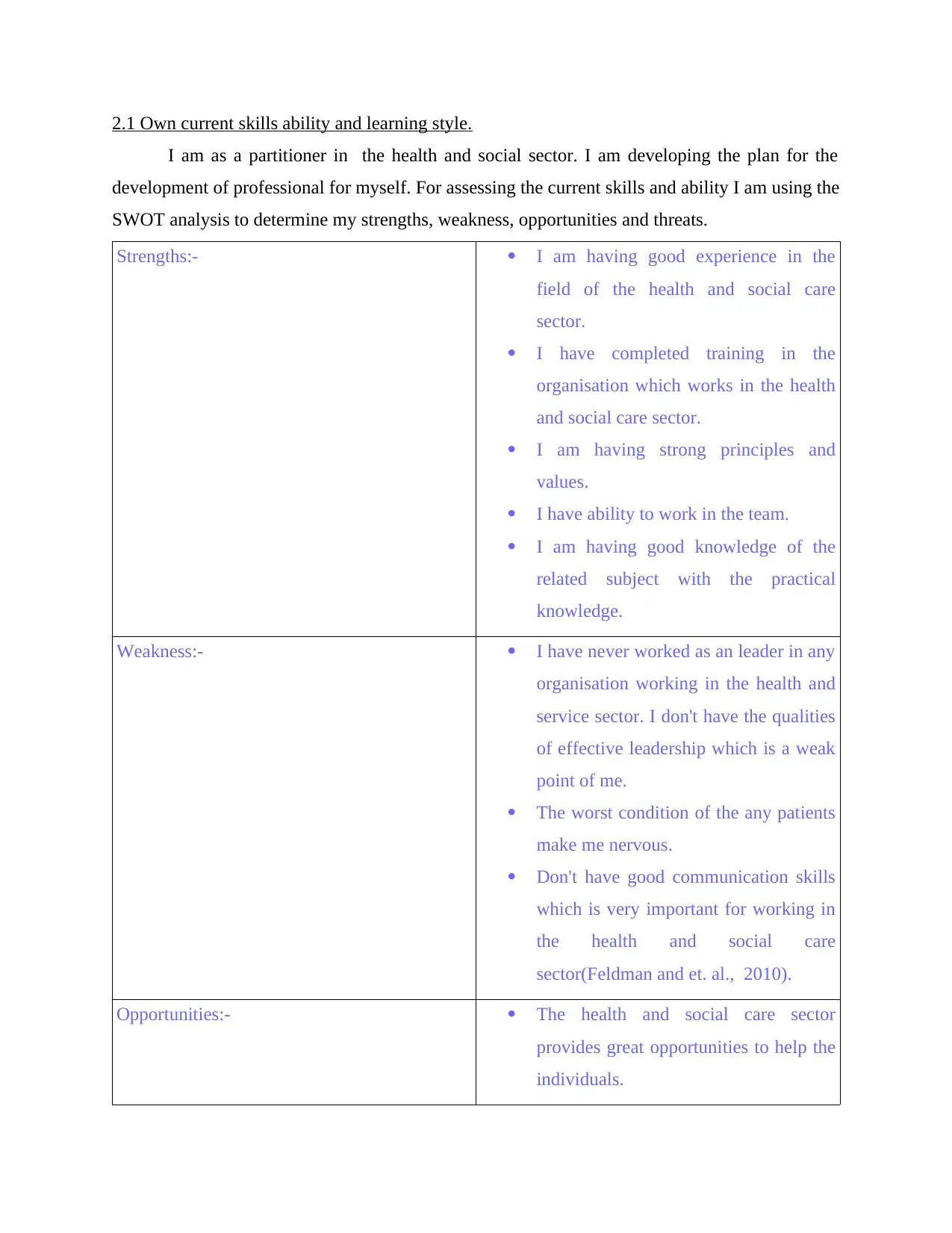
2.1 Own current skills ability and learning style.
I am as a partitioner in the health and social sector. I am developing the plan for the
development of professional for myself. For assessing the current skills and ability I am using the
SWOT analysis to determine my strengths, weakness, opportunities and threats.
Strengths:- I am having good experience in the
field of the health and social care
sector.
I have completed training in the
organisation which works in the health
and social care sector.
I am having strong principles and
values.
I have ability to work in the team.
I am having good knowledge of the
related subject with the practical
knowledge.
Weakness:- I have never worked as an leader in any
organisation working in the health and
service sector. I don't have the qualities
of effective leadership which is a weak
point of me.
The worst condition of the any patients
make me nervous.
Don't have good communication skills
which is very important for working in
the health and social care
sector(Feldman and et. al., 2010).
Opportunities:- The health and social care sector
provides great opportunities to help the
individuals.
I am as a partitioner in the health and social sector. I am developing the plan for the
development of professional for myself. For assessing the current skills and ability I am using the
SWOT analysis to determine my strengths, weakness, opportunities and threats.
Strengths:- I am having good experience in the
field of the health and social care
sector.
I have completed training in the
organisation which works in the health
and social care sector.
I am having strong principles and
values.
I have ability to work in the team.
I am having good knowledge of the
related subject with the practical
knowledge.
Weakness:- I have never worked as an leader in any
organisation working in the health and
service sector. I don't have the qualities
of effective leadership which is a weak
point of me.
The worst condition of the any patients
make me nervous.
Don't have good communication skills
which is very important for working in
the health and social care
sector(Feldman and et. al., 2010).
Opportunities:- The health and social care sector
provides great opportunities to help the
individuals.
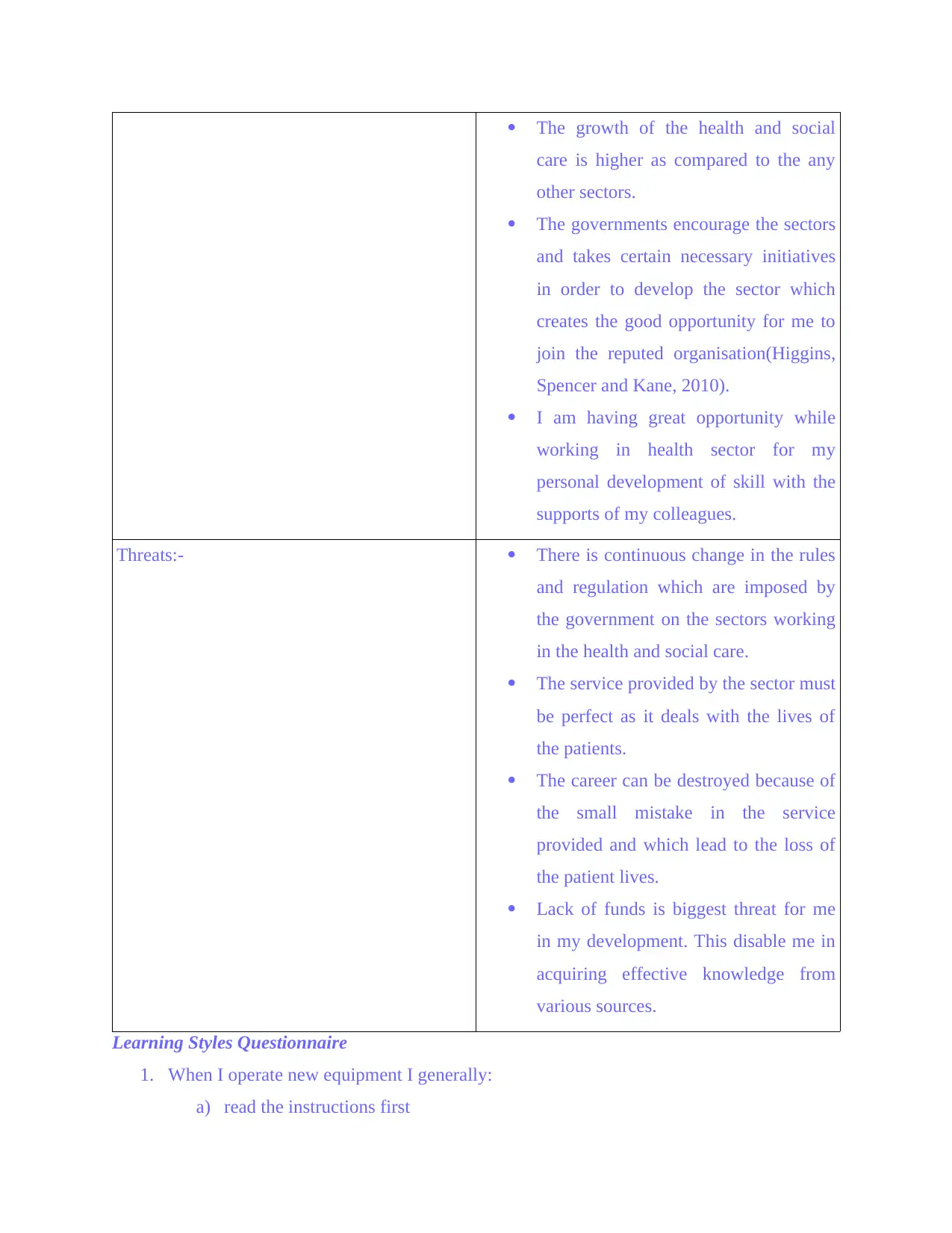
The growth of the health and social
care is higher as compared to the any
other sectors.
The governments encourage the sectors
and takes certain necessary initiatives
in order to develop the sector which
creates the good opportunity for me to
join the reputed organisation(Higgins,
Spencer and Kane, 2010).
I am having great opportunity while
working in health sector for my
personal development of skill with the
supports of my colleagues.
Threats:- There is continuous change in the rules
and regulation which are imposed by
the government on the sectors working
in the health and social care.
The service provided by the sector must
be perfect as it deals with the lives of
the patients.
The career can be destroyed because of
the small mistake in the service
provided and which lead to the loss of
the patient lives.
Lack of funds is biggest threat for me
in my development. This disable me in
acquiring effective knowledge from
various sources.
Learning Styles Questionnaire
1. When I operate new equipment I generally:
a) read the instructions first
care is higher as compared to the any
other sectors.
The governments encourage the sectors
and takes certain necessary initiatives
in order to develop the sector which
creates the good opportunity for me to
join the reputed organisation(Higgins,
Spencer and Kane, 2010).
I am having great opportunity while
working in health sector for my
personal development of skill with the
supports of my colleagues.
Threats:- There is continuous change in the rules
and regulation which are imposed by
the government on the sectors working
in the health and social care.
The service provided by the sector must
be perfect as it deals with the lives of
the patients.
The career can be destroyed because of
the small mistake in the service
provided and which lead to the loss of
the patient lives.
Lack of funds is biggest threat for me
in my development. This disable me in
acquiring effective knowledge from
various sources.
Learning Styles Questionnaire
1. When I operate new equipment I generally:
a) read the instructions first
Paraphrase This Document
Need a fresh take? Get an instant paraphrase of this document with our AI Paraphraser
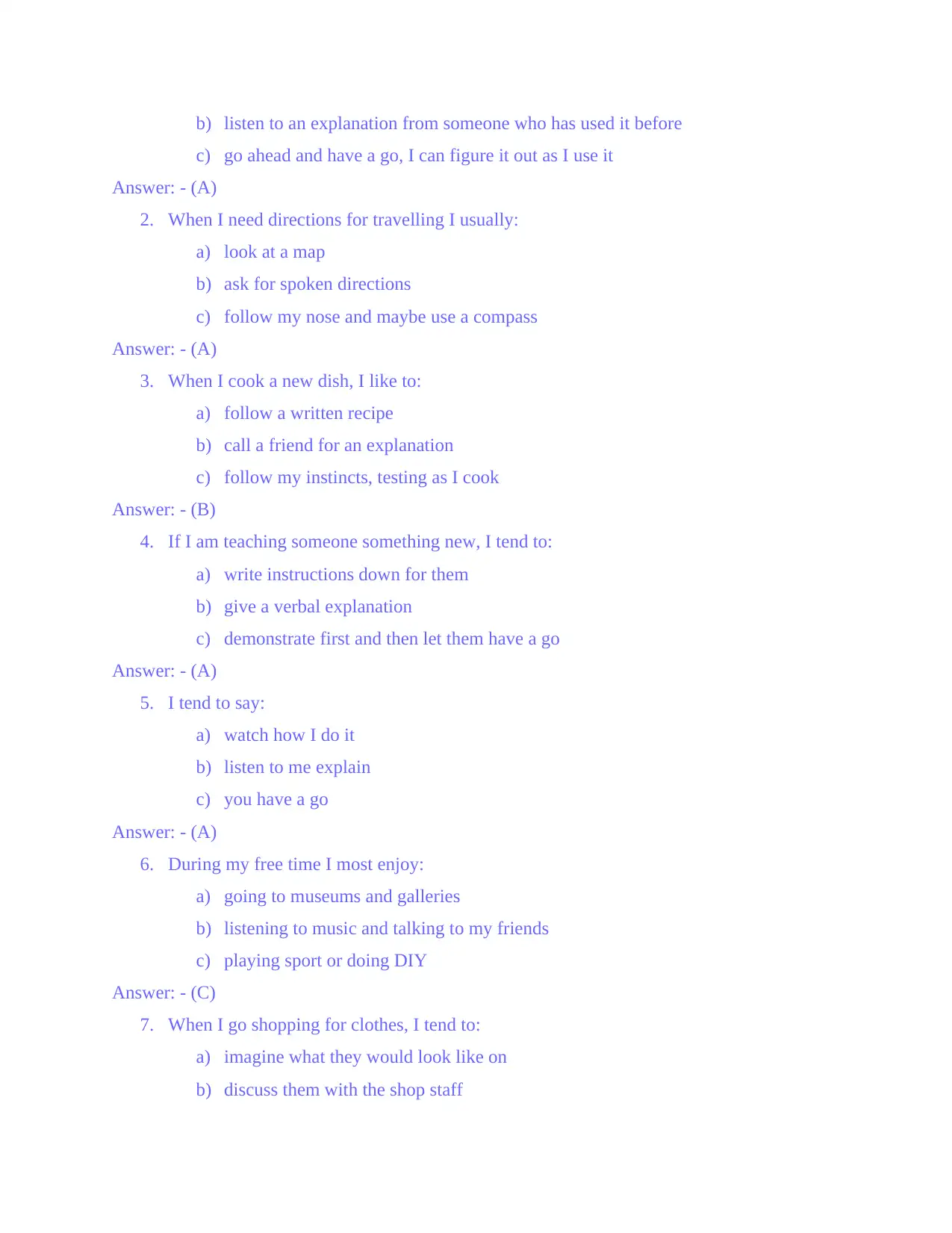
b) listen to an explanation from someone who has used it before
c) go ahead and have a go, I can figure it out as I use it
Answer: - (A)
2. When I need directions for travelling I usually:
a) look at a map
b) ask for spoken directions
c) follow my nose and maybe use a compass
Answer: - (A)
3. When I cook a new dish, I like to:
a) follow a written recipe
b) call a friend for an explanation
c) follow my instincts, testing as I cook
Answer: - (B)
4. If I am teaching someone something new, I tend to:
a) write instructions down for them
b) give a verbal explanation
c) demonstrate first and then let them have a go
Answer: - (A)
5. I tend to say:
a) watch how I do it
b) listen to me explain
c) you have a go
Answer: - (A)
6. During my free time I most enjoy:
a) going to museums and galleries
b) listening to music and talking to my friends
c) playing sport or doing DIY
Answer: - (C)
7. When I go shopping for clothes, I tend to:
a) imagine what they would look like on
b) discuss them with the shop staff
c) go ahead and have a go, I can figure it out as I use it
Answer: - (A)
2. When I need directions for travelling I usually:
a) look at a map
b) ask for spoken directions
c) follow my nose and maybe use a compass
Answer: - (A)
3. When I cook a new dish, I like to:
a) follow a written recipe
b) call a friend for an explanation
c) follow my instincts, testing as I cook
Answer: - (B)
4. If I am teaching someone something new, I tend to:
a) write instructions down for them
b) give a verbal explanation
c) demonstrate first and then let them have a go
Answer: - (A)
5. I tend to say:
a) watch how I do it
b) listen to me explain
c) you have a go
Answer: - (A)
6. During my free time I most enjoy:
a) going to museums and galleries
b) listening to music and talking to my friends
c) playing sport or doing DIY
Answer: - (C)
7. When I go shopping for clothes, I tend to:
a) imagine what they would look like on
b) discuss them with the shop staff
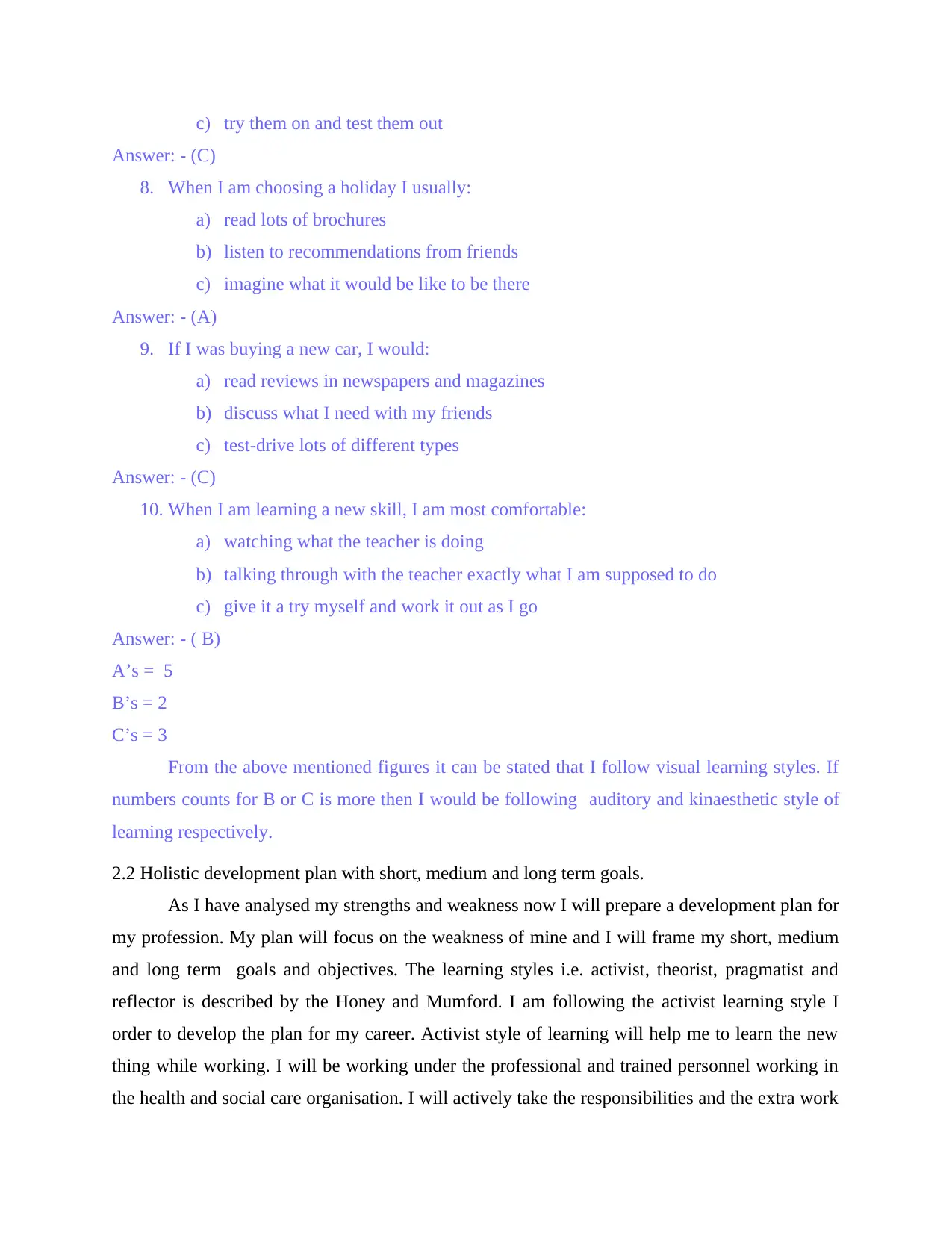
c) try them on and test them out
Answer: - (C)
8. When I am choosing a holiday I usually:
a) read lots of brochures
b) listen to recommendations from friends
c) imagine what it would be like to be there
Answer: - (A)
9. If I was buying a new car, I would:
a) read reviews in newspapers and magazines
b) discuss what I need with my friends
c) test-drive lots of different types
Answer: - (C)
10. When I am learning a new skill, I am most comfortable:
a) watching what the teacher is doing
b) talking through with the teacher exactly what I am supposed to do
c) give it a try myself and work it out as I go
Answer: - ( B)
A’s = 5
B’s = 2
C’s = 3
From the above mentioned figures it can be stated that I follow visual learning styles. If
numbers counts for B or C is more then I would be following auditory and kinaesthetic style of
learning respectively.
2.2 Holistic development plan with short, medium and long term goals.
As I have analysed my strengths and weakness now I will prepare a development plan for
my profession. My plan will focus on the weakness of mine and I will frame my short, medium
and long term goals and objectives. The learning styles i.e. activist, theorist, pragmatist and
reflector is described by the Honey and Mumford. I am following the activist learning style I
order to develop the plan for my career. Activist style of learning will help me to learn the new
thing while working. I will be working under the professional and trained personnel working in
the health and social care organisation. I will actively take the responsibilities and the extra work
Answer: - (C)
8. When I am choosing a holiday I usually:
a) read lots of brochures
b) listen to recommendations from friends
c) imagine what it would be like to be there
Answer: - (A)
9. If I was buying a new car, I would:
a) read reviews in newspapers and magazines
b) discuss what I need with my friends
c) test-drive lots of different types
Answer: - (C)
10. When I am learning a new skill, I am most comfortable:
a) watching what the teacher is doing
b) talking through with the teacher exactly what I am supposed to do
c) give it a try myself and work it out as I go
Answer: - ( B)
A’s = 5
B’s = 2
C’s = 3
From the above mentioned figures it can be stated that I follow visual learning styles. If
numbers counts for B or C is more then I would be following auditory and kinaesthetic style of
learning respectively.
2.2 Holistic development plan with short, medium and long term goals.
As I have analysed my strengths and weakness now I will prepare a development plan for
my profession. My plan will focus on the weakness of mine and I will frame my short, medium
and long term goals and objectives. The learning styles i.e. activist, theorist, pragmatist and
reflector is described by the Honey and Mumford. I am following the activist learning style I
order to develop the plan for my career. Activist style of learning will help me to learn the new
thing while working. I will be working under the professional and trained personnel working in
the health and social care organisation. I will actively take the responsibilities and the extra work
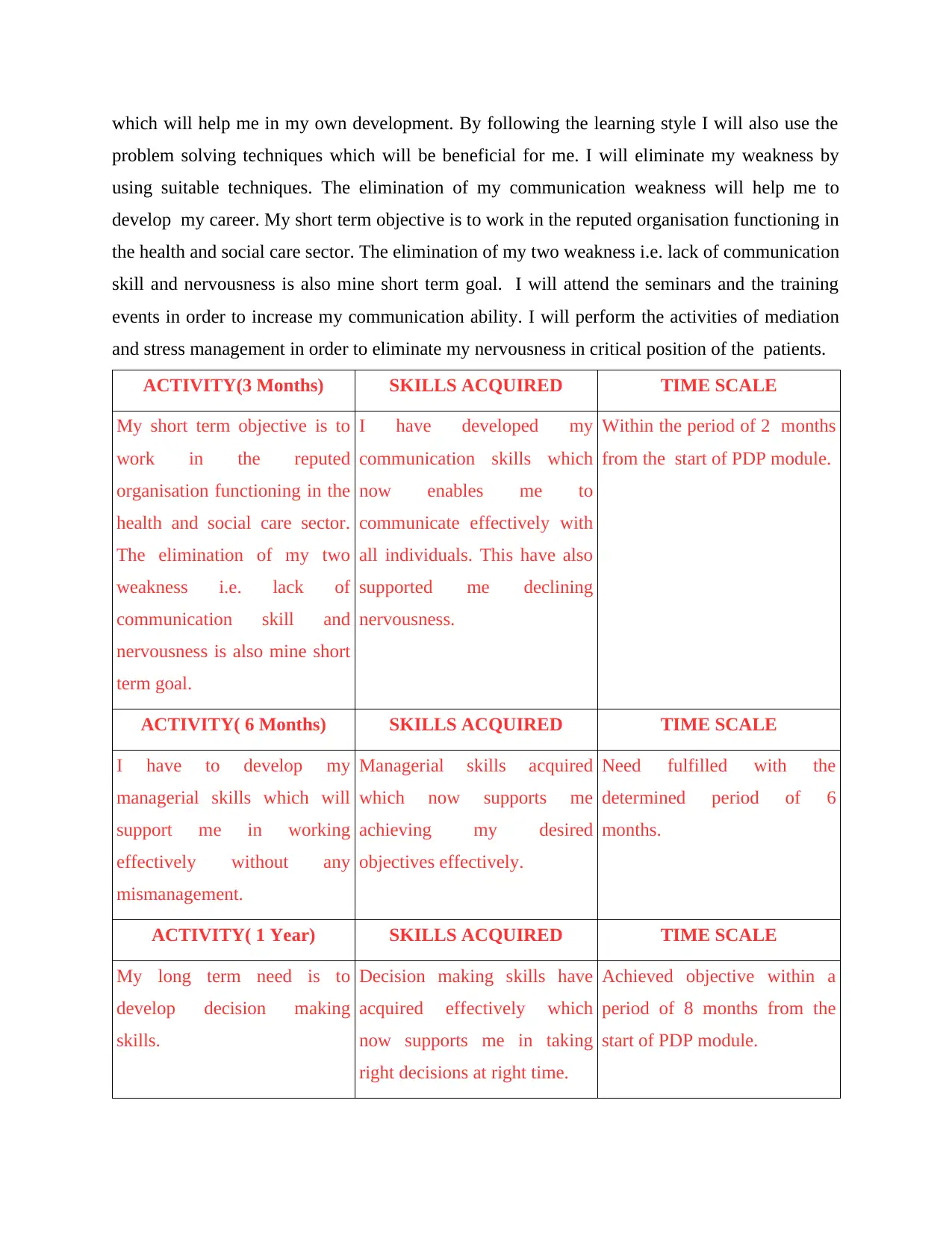
which will help me in my own development. By following the learning style I will also use the
problem solving techniques which will be beneficial for me. I will eliminate my weakness by
using suitable techniques. The elimination of my communication weakness will help me to
develop my career. My short term objective is to work in the reputed organisation functioning in
the health and social care sector. The elimination of my two weakness i.e. lack of communication
skill and nervousness is also mine short term goal. I will attend the seminars and the training
events in order to increase my communication ability. I will perform the activities of mediation
and stress management in order to eliminate my nervousness in critical position of the patients.
ACTIVITY(3 Months) SKILLS ACQUIRED TIME SCALE
My short term objective is to
work in the reputed
organisation functioning in the
health and social care sector.
The elimination of my two
weakness i.e. lack of
communication skill and
nervousness is also mine short
term goal.
I have developed my
communication skills which
now enables me to
communicate effectively with
all individuals. This have also
supported me declining
nervousness.
Within the period of 2 months
from the start of PDP module.
ACTIVITY( 6 Months) SKILLS ACQUIRED TIME SCALE
I have to develop my
managerial skills which will
support me in working
effectively without any
mismanagement.
Managerial skills acquired
which now supports me
achieving my desired
objectives effectively.
Need fulfilled with the
determined period of 6
months.
ACTIVITY( 1 Year) SKILLS ACQUIRED TIME SCALE
My long term need is to
develop decision making
skills.
Decision making skills have
acquired effectively which
now supports me in taking
right decisions at right time.
Achieved objective within a
period of 8 months from the
start of PDP module.
problem solving techniques which will be beneficial for me. I will eliminate my weakness by
using suitable techniques. The elimination of my communication weakness will help me to
develop my career. My short term objective is to work in the reputed organisation functioning in
the health and social care sector. The elimination of my two weakness i.e. lack of communication
skill and nervousness is also mine short term goal. I will attend the seminars and the training
events in order to increase my communication ability. I will perform the activities of mediation
and stress management in order to eliminate my nervousness in critical position of the patients.
ACTIVITY(3 Months) SKILLS ACQUIRED TIME SCALE
My short term objective is to
work in the reputed
organisation functioning in the
health and social care sector.
The elimination of my two
weakness i.e. lack of
communication skill and
nervousness is also mine short
term goal.
I have developed my
communication skills which
now enables me to
communicate effectively with
all individuals. This have also
supported me declining
nervousness.
Within the period of 2 months
from the start of PDP module.
ACTIVITY( 6 Months) SKILLS ACQUIRED TIME SCALE
I have to develop my
managerial skills which will
support me in working
effectively without any
mismanagement.
Managerial skills acquired
which now supports me
achieving my desired
objectives effectively.
Need fulfilled with the
determined period of 6
months.
ACTIVITY( 1 Year) SKILLS ACQUIRED TIME SCALE
My long term need is to
develop decision making
skills.
Decision making skills have
acquired effectively which
now supports me in taking
right decisions at right time.
Achieved objective within a
period of 8 months from the
start of PDP module.
Secure Best Marks with AI Grader
Need help grading? Try our AI Grader for instant feedback on your assignments.
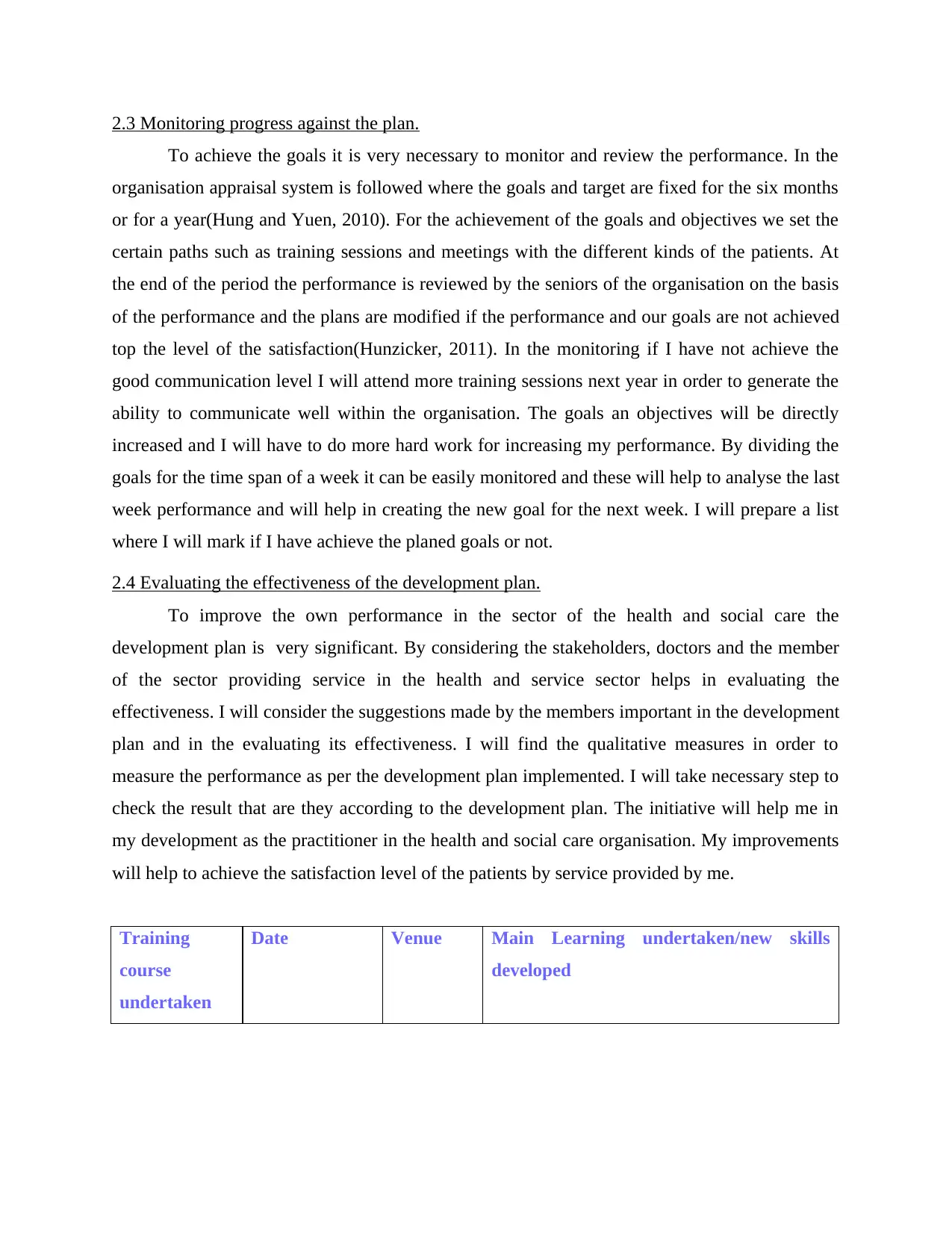
2.3 Monitoring progress against the plan.
To achieve the goals it is very necessary to monitor and review the performance. In the
organisation appraisal system is followed where the goals and target are fixed for the six months
or for a year(Hung and Yuen, 2010). For the achievement of the goals and objectives we set the
certain paths such as training sessions and meetings with the different kinds of the patients. At
the end of the period the performance is reviewed by the seniors of the organisation on the basis
of the performance and the plans are modified if the performance and our goals are not achieved
top the level of the satisfaction(Hunzicker, 2011). In the monitoring if I have not achieve the
good communication level I will attend more training sessions next year in order to generate the
ability to communicate well within the organisation. The goals an objectives will be directly
increased and I will have to do more hard work for increasing my performance. By dividing the
goals for the time span of a week it can be easily monitored and these will help to analyse the last
week performance and will help in creating the new goal for the next week. I will prepare a list
where I will mark if I have achieve the planed goals or not.
2.4 Evaluating the effectiveness of the development plan.
To improve the own performance in the sector of the health and social care the
development plan is very significant. By considering the stakeholders, doctors and the member
of the sector providing service in the health and service sector helps in evaluating the
effectiveness. I will consider the suggestions made by the members important in the development
plan and in the evaluating its effectiveness. I will find the qualitative measures in order to
measure the performance as per the development plan implemented. I will take necessary step to
check the result that are they according to the development plan. The initiative will help me in
my development as the practitioner in the health and social care organisation. My improvements
will help to achieve the satisfaction level of the patients by service provided by me.
Training
course
undertaken
Date Venue Main Learning undertaken/new skills
developed
To achieve the goals it is very necessary to monitor and review the performance. In the
organisation appraisal system is followed where the goals and target are fixed for the six months
or for a year(Hung and Yuen, 2010). For the achievement of the goals and objectives we set the
certain paths such as training sessions and meetings with the different kinds of the patients. At
the end of the period the performance is reviewed by the seniors of the organisation on the basis
of the performance and the plans are modified if the performance and our goals are not achieved
top the level of the satisfaction(Hunzicker, 2011). In the monitoring if I have not achieve the
good communication level I will attend more training sessions next year in order to generate the
ability to communicate well within the organisation. The goals an objectives will be directly
increased and I will have to do more hard work for increasing my performance. By dividing the
goals for the time span of a week it can be easily monitored and these will help to analyse the last
week performance and will help in creating the new goal for the next week. I will prepare a list
where I will mark if I have achieve the planed goals or not.
2.4 Evaluating the effectiveness of the development plan.
To improve the own performance in the sector of the health and social care the
development plan is very significant. By considering the stakeholders, doctors and the member
of the sector providing service in the health and service sector helps in evaluating the
effectiveness. I will consider the suggestions made by the members important in the development
plan and in the evaluating its effectiveness. I will find the qualitative measures in order to
measure the performance as per the development plan implemented. I will take necessary step to
check the result that are they according to the development plan. The initiative will help me in
my development as the practitioner in the health and social care organisation. My improvements
will help to achieve the satisfaction level of the patients by service provided by me.
Training
course
undertaken
Date Venue Main Learning undertaken/new skills
developed
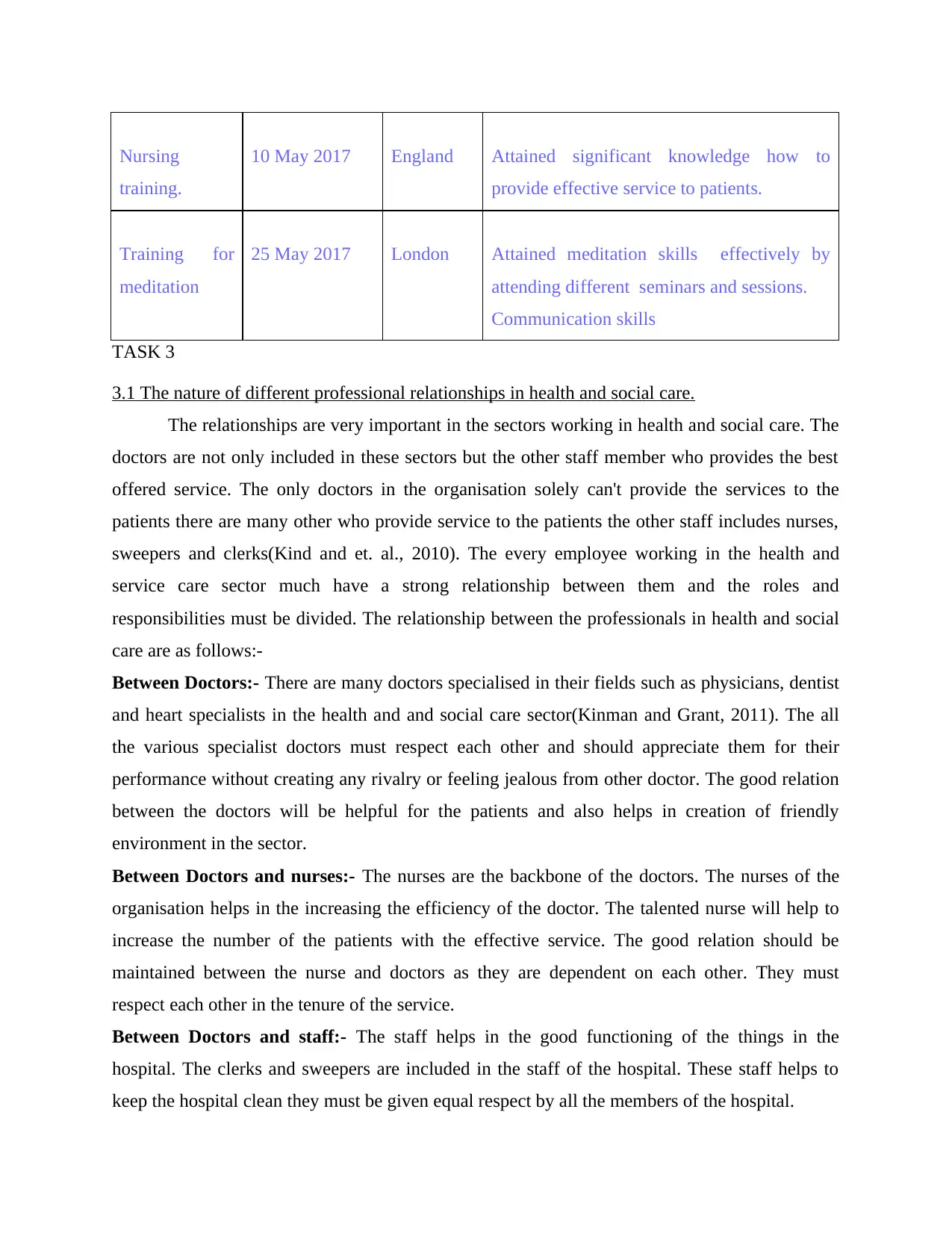
Nursing
training.
10 May 2017 England Attained significant knowledge how to
provide effective service to patients.
Training for
meditation
25 May 2017 London Attained meditation skills effectively by
attending different seminars and sessions.
Communication skills
TASK 3
3.1 The nature of different professional relationships in health and social care.
The relationships are very important in the sectors working in health and social care. The
doctors are not only included in these sectors but the other staff member who provides the best
offered service. The only doctors in the organisation solely can't provide the services to the
patients there are many other who provide service to the patients the other staff includes nurses,
sweepers and clerks(Kind and et. al., 2010). The every employee working in the health and
service care sector much have a strong relationship between them and the roles and
responsibilities must be divided. The relationship between the professionals in health and social
care are as follows:-
Between Doctors:- There are many doctors specialised in their fields such as physicians, dentist
and heart specialists in the health and and social care sector(Kinman and Grant, 2011). The all
the various specialist doctors must respect each other and should appreciate them for their
performance without creating any rivalry or feeling jealous from other doctor. The good relation
between the doctors will be helpful for the patients and also helps in creation of friendly
environment in the sector.
Between Doctors and nurses:- The nurses are the backbone of the doctors. The nurses of the
organisation helps in the increasing the efficiency of the doctor. The talented nurse will help to
increase the number of the patients with the effective service. The good relation should be
maintained between the nurse and doctors as they are dependent on each other. They must
respect each other in the tenure of the service.
Between Doctors and staff:- The staff helps in the good functioning of the things in the
hospital. The clerks and sweepers are included in the staff of the hospital. These staff helps to
keep the hospital clean they must be given equal respect by all the members of the hospital.
training.
10 May 2017 England Attained significant knowledge how to
provide effective service to patients.
Training for
meditation
25 May 2017 London Attained meditation skills effectively by
attending different seminars and sessions.
Communication skills
TASK 3
3.1 The nature of different professional relationships in health and social care.
The relationships are very important in the sectors working in health and social care. The
doctors are not only included in these sectors but the other staff member who provides the best
offered service. The only doctors in the organisation solely can't provide the services to the
patients there are many other who provide service to the patients the other staff includes nurses,
sweepers and clerks(Kind and et. al., 2010). The every employee working in the health and
service care sector much have a strong relationship between them and the roles and
responsibilities must be divided. The relationship between the professionals in health and social
care are as follows:-
Between Doctors:- There are many doctors specialised in their fields such as physicians, dentist
and heart specialists in the health and and social care sector(Kinman and Grant, 2011). The all
the various specialist doctors must respect each other and should appreciate them for their
performance without creating any rivalry or feeling jealous from other doctor. The good relation
between the doctors will be helpful for the patients and also helps in creation of friendly
environment in the sector.
Between Doctors and nurses:- The nurses are the backbone of the doctors. The nurses of the
organisation helps in the increasing the efficiency of the doctor. The talented nurse will help to
increase the number of the patients with the effective service. The good relation should be
maintained between the nurse and doctors as they are dependent on each other. They must
respect each other in the tenure of the service.
Between Doctors and staff:- The staff helps in the good functioning of the things in the
hospital. The clerks and sweepers are included in the staff of the hospital. These staff helps to
keep the hospital clean they must be given equal respect by all the members of the hospital.
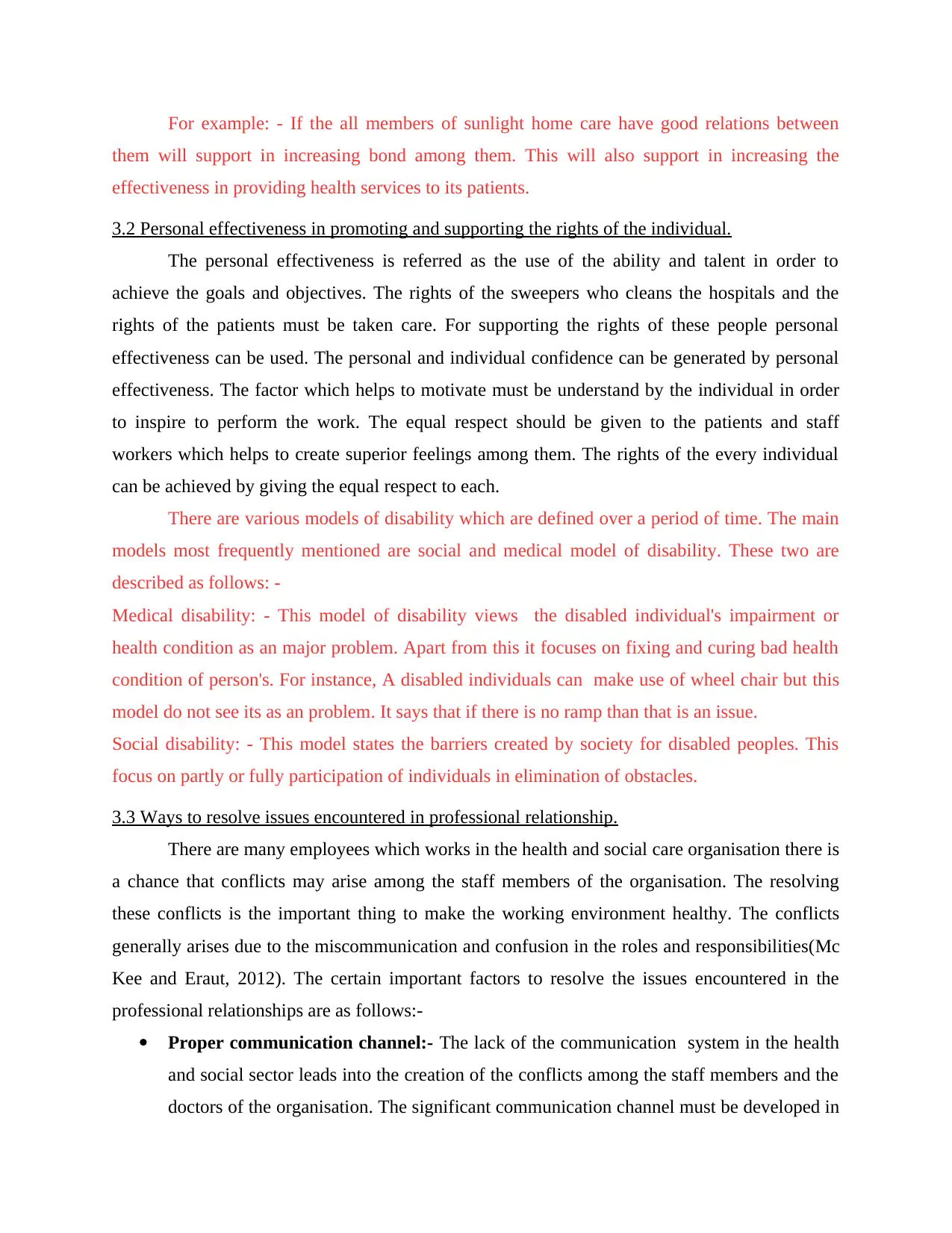
For example: - If the all members of sunlight home care have good relations between
them will support in increasing bond among them. This will also support in increasing the
effectiveness in providing health services to its patients.
3.2 Personal effectiveness in promoting and supporting the rights of the individual.
The personal effectiveness is referred as the use of the ability and talent in order to
achieve the goals and objectives. The rights of the sweepers who cleans the hospitals and the
rights of the patients must be taken care. For supporting the rights of these people personal
effectiveness can be used. The personal and individual confidence can be generated by personal
effectiveness. The factor which helps to motivate must be understand by the individual in order
to inspire to perform the work. The equal respect should be given to the patients and staff
workers which helps to create superior feelings among them. The rights of the every individual
can be achieved by giving the equal respect to each.
There are various models of disability which are defined over a period of time. The main
models most frequently mentioned are social and medical model of disability. These two are
described as follows: -
Medical disability: - This model of disability views the disabled individual's impairment or
health condition as an major problem. Apart from this it focuses on fixing and curing bad health
condition of person's. For instance, A disabled individuals can make use of wheel chair but this
model do not see its as an problem. It says that if there is no ramp than that is an issue.
Social disability: - This model states the barriers created by society for disabled peoples. This
focus on partly or fully participation of individuals in elimination of obstacles.
3.3 Ways to resolve issues encountered in professional relationship.
There are many employees which works in the health and social care organisation there is
a chance that conflicts may arise among the staff members of the organisation. The resolving
these conflicts is the important thing to make the working environment healthy. The conflicts
generally arises due to the miscommunication and confusion in the roles and responsibilities(Mc
Kee and Eraut, 2012). The certain important factors to resolve the issues encountered in the
professional relationships are as follows:-
Proper communication channel:- The lack of the communication system in the health
and social sector leads into the creation of the conflicts among the staff members and the
doctors of the organisation. The significant communication channel must be developed in
them will support in increasing bond among them. This will also support in increasing the
effectiveness in providing health services to its patients.
3.2 Personal effectiveness in promoting and supporting the rights of the individual.
The personal effectiveness is referred as the use of the ability and talent in order to
achieve the goals and objectives. The rights of the sweepers who cleans the hospitals and the
rights of the patients must be taken care. For supporting the rights of these people personal
effectiveness can be used. The personal and individual confidence can be generated by personal
effectiveness. The factor which helps to motivate must be understand by the individual in order
to inspire to perform the work. The equal respect should be given to the patients and staff
workers which helps to create superior feelings among them. The rights of the every individual
can be achieved by giving the equal respect to each.
There are various models of disability which are defined over a period of time. The main
models most frequently mentioned are social and medical model of disability. These two are
described as follows: -
Medical disability: - This model of disability views the disabled individual's impairment or
health condition as an major problem. Apart from this it focuses on fixing and curing bad health
condition of person's. For instance, A disabled individuals can make use of wheel chair but this
model do not see its as an problem. It says that if there is no ramp than that is an issue.
Social disability: - This model states the barriers created by society for disabled peoples. This
focus on partly or fully participation of individuals in elimination of obstacles.
3.3 Ways to resolve issues encountered in professional relationship.
There are many employees which works in the health and social care organisation there is
a chance that conflicts may arise among the staff members of the organisation. The resolving
these conflicts is the important thing to make the working environment healthy. The conflicts
generally arises due to the miscommunication and confusion in the roles and responsibilities(Mc
Kee and Eraut, 2012). The certain important factors to resolve the issues encountered in the
professional relationships are as follows:-
Proper communication channel:- The lack of the communication system in the health
and social sector leads into the creation of the conflicts among the staff members and the
doctors of the organisation. The significant communication channel must be developed in
Paraphrase This Document
Need a fresh take? Get an instant paraphrase of this document with our AI Paraphraser
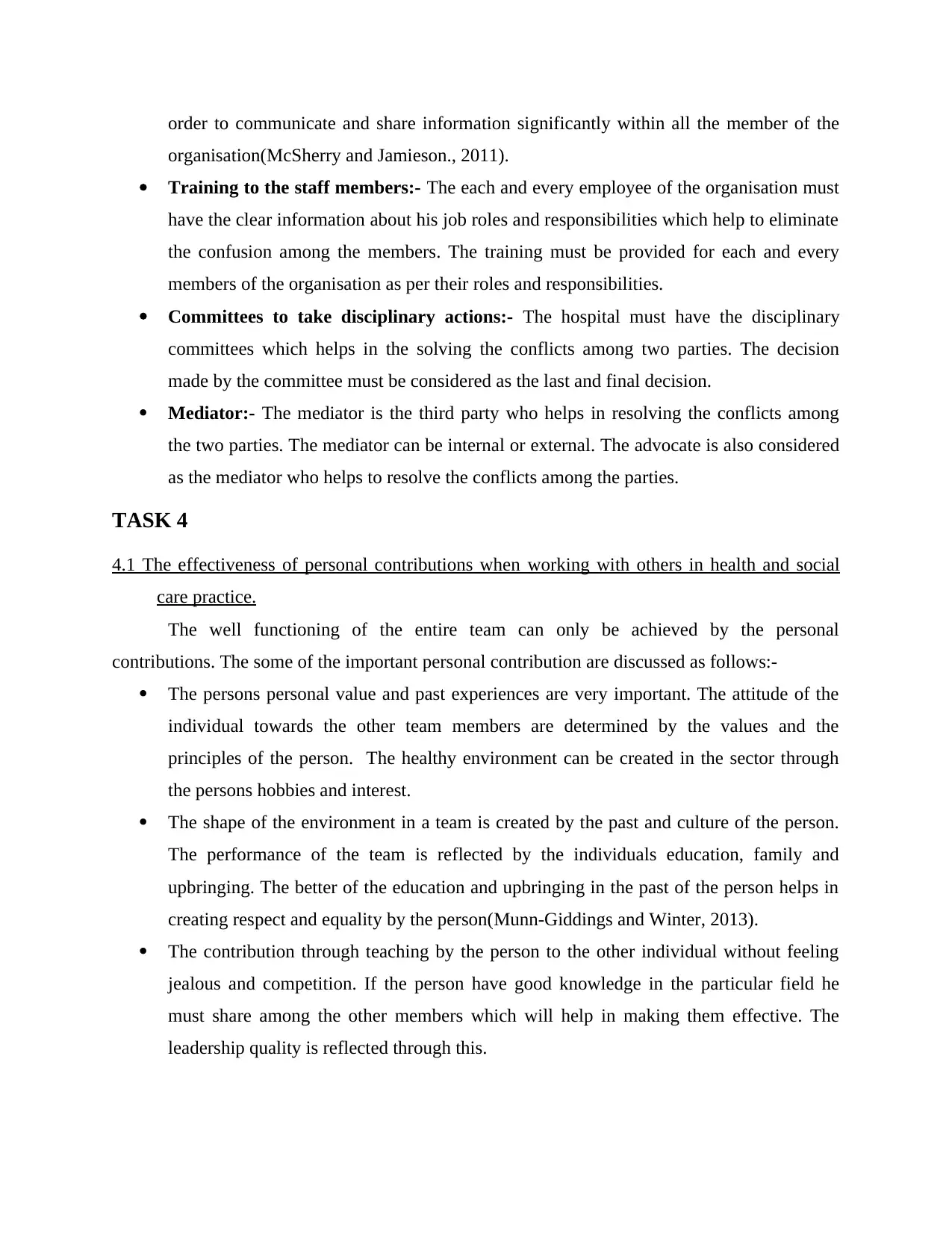
order to communicate and share information significantly within all the member of the
organisation(McSherry and Jamieson., 2011).
Training to the staff members:- The each and every employee of the organisation must
have the clear information about his job roles and responsibilities which help to eliminate
the confusion among the members. The training must be provided for each and every
members of the organisation as per their roles and responsibilities.
Committees to take disciplinary actions:- The hospital must have the disciplinary
committees which helps in the solving the conflicts among two parties. The decision
made by the committee must be considered as the last and final decision.
Mediator:- The mediator is the third party who helps in resolving the conflicts among
the two parties. The mediator can be internal or external. The advocate is also considered
as the mediator who helps to resolve the conflicts among the parties.
TASK 4
4.1 The effectiveness of personal contributions when working with others in health and social
care practice.
The well functioning of the entire team can only be achieved by the personal
contributions. The some of the important personal contribution are discussed as follows:-
The persons personal value and past experiences are very important. The attitude of the
individual towards the other team members are determined by the values and the
principles of the person. The healthy environment can be created in the sector through
the persons hobbies and interest.
The shape of the environment in a team is created by the past and culture of the person.
The performance of the team is reflected by the individuals education, family and
upbringing. The better of the education and upbringing in the past of the person helps in
creating respect and equality by the person(Munn-Giddings and Winter, 2013).
The contribution through teaching by the person to the other individual without feeling
jealous and competition. If the person have good knowledge in the particular field he
must share among the other members which will help in making them effective. The
leadership quality is reflected through this.
organisation(McSherry and Jamieson., 2011).
Training to the staff members:- The each and every employee of the organisation must
have the clear information about his job roles and responsibilities which help to eliminate
the confusion among the members. The training must be provided for each and every
members of the organisation as per their roles and responsibilities.
Committees to take disciplinary actions:- The hospital must have the disciplinary
committees which helps in the solving the conflicts among two parties. The decision
made by the committee must be considered as the last and final decision.
Mediator:- The mediator is the third party who helps in resolving the conflicts among
the two parties. The mediator can be internal or external. The advocate is also considered
as the mediator who helps to resolve the conflicts among the parties.
TASK 4
4.1 The effectiveness of personal contributions when working with others in health and social
care practice.
The well functioning of the entire team can only be achieved by the personal
contributions. The some of the important personal contribution are discussed as follows:-
The persons personal value and past experiences are very important. The attitude of the
individual towards the other team members are determined by the values and the
principles of the person. The healthy environment can be created in the sector through
the persons hobbies and interest.
The shape of the environment in a team is created by the past and culture of the person.
The performance of the team is reflected by the individuals education, family and
upbringing. The better of the education and upbringing in the past of the person helps in
creating respect and equality by the person(Munn-Giddings and Winter, 2013).
The contribution through teaching by the person to the other individual without feeling
jealous and competition. If the person have good knowledge in the particular field he
must share among the other members which will help in making them effective. The
leadership quality is reflected through this.
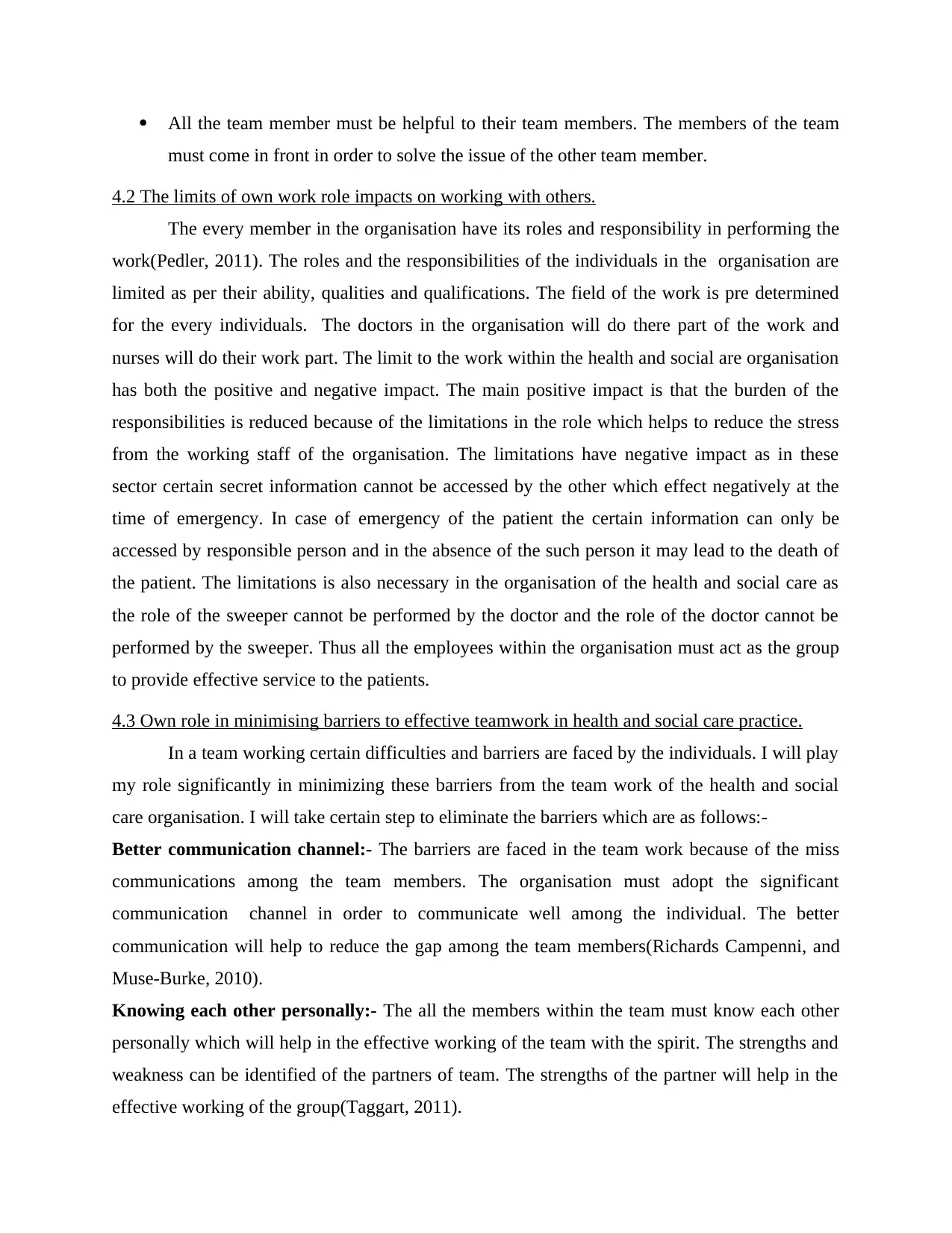
All the team member must be helpful to their team members. The members of the team
must come in front in order to solve the issue of the other team member.
4.2 The limits of own work role impacts on working with others.
The every member in the organisation have its roles and responsibility in performing the
work(Pedler, 2011). The roles and the responsibilities of the individuals in the organisation are
limited as per their ability, qualities and qualifications. The field of the work is pre determined
for the every individuals. The doctors in the organisation will do there part of the work and
nurses will do their work part. The limit to the work within the health and social are organisation
has both the positive and negative impact. The main positive impact is that the burden of the
responsibilities is reduced because of the limitations in the role which helps to reduce the stress
from the working staff of the organisation. The limitations have negative impact as in these
sector certain secret information cannot be accessed by the other which effect negatively at the
time of emergency. In case of emergency of the patient the certain information can only be
accessed by responsible person and in the absence of the such person it may lead to the death of
the patient. The limitations is also necessary in the organisation of the health and social care as
the role of the sweeper cannot be performed by the doctor and the role of the doctor cannot be
performed by the sweeper. Thus all the employees within the organisation must act as the group
to provide effective service to the patients.
4.3 Own role in minimising barriers to effective teamwork in health and social care practice.
In a team working certain difficulties and barriers are faced by the individuals. I will play
my role significantly in minimizing these barriers from the team work of the health and social
care organisation. I will take certain step to eliminate the barriers which are as follows:-
Better communication channel:- The barriers are faced in the team work because of the miss
communications among the team members. The organisation must adopt the significant
communication channel in order to communicate well among the individual. The better
communication will help to reduce the gap among the team members(Richards Campenni, and
Muse-Burke, 2010).
Knowing each other personally:- The all the members within the team must know each other
personally which will help in the effective working of the team with the spirit. The strengths and
weakness can be identified of the partners of team. The strengths of the partner will help in the
effective working of the group(Taggart, 2011).
must come in front in order to solve the issue of the other team member.
4.2 The limits of own work role impacts on working with others.
The every member in the organisation have its roles and responsibility in performing the
work(Pedler, 2011). The roles and the responsibilities of the individuals in the organisation are
limited as per their ability, qualities and qualifications. The field of the work is pre determined
for the every individuals. The doctors in the organisation will do there part of the work and
nurses will do their work part. The limit to the work within the health and social are organisation
has both the positive and negative impact. The main positive impact is that the burden of the
responsibilities is reduced because of the limitations in the role which helps to reduce the stress
from the working staff of the organisation. The limitations have negative impact as in these
sector certain secret information cannot be accessed by the other which effect negatively at the
time of emergency. In case of emergency of the patient the certain information can only be
accessed by responsible person and in the absence of the such person it may lead to the death of
the patient. The limitations is also necessary in the organisation of the health and social care as
the role of the sweeper cannot be performed by the doctor and the role of the doctor cannot be
performed by the sweeper. Thus all the employees within the organisation must act as the group
to provide effective service to the patients.
4.3 Own role in minimising barriers to effective teamwork in health and social care practice.
In a team working certain difficulties and barriers are faced by the individuals. I will play
my role significantly in minimizing these barriers from the team work of the health and social
care organisation. I will take certain step to eliminate the barriers which are as follows:-
Better communication channel:- The barriers are faced in the team work because of the miss
communications among the team members. The organisation must adopt the significant
communication channel in order to communicate well among the individual. The better
communication will help to reduce the gap among the team members(Richards Campenni, and
Muse-Burke, 2010).
Knowing each other personally:- The all the members within the team must know each other
personally which will help in the effective working of the team with the spirit. The strengths and
weakness can be identified of the partners of team. The strengths of the partner will help in the
effective working of the group(Taggart, 2011).
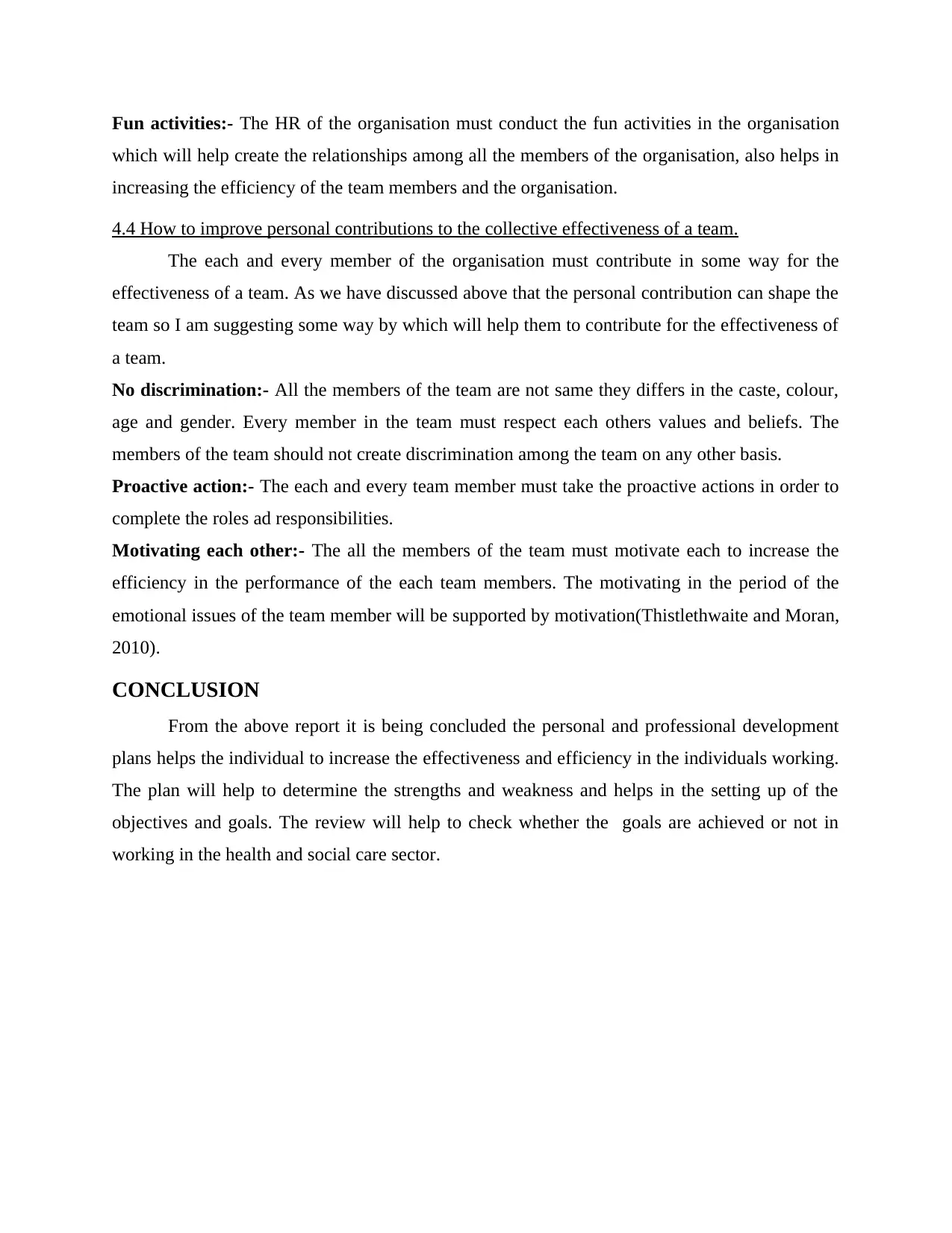
Fun activities:- The HR of the organisation must conduct the fun activities in the organisation
which will help create the relationships among all the members of the organisation, also helps in
increasing the efficiency of the team members and the organisation.
4.4 How to improve personal contributions to the collective effectiveness of a team.
The each and every member of the organisation must contribute in some way for the
effectiveness of a team. As we have discussed above that the personal contribution can shape the
team so I am suggesting some way by which will help them to contribute for the effectiveness of
a team.
No discrimination:- All the members of the team are not same they differs in the caste, colour,
age and gender. Every member in the team must respect each others values and beliefs. The
members of the team should not create discrimination among the team on any other basis.
Proactive action:- The each and every team member must take the proactive actions in order to
complete the roles ad responsibilities.
Motivating each other:- The all the members of the team must motivate each to increase the
efficiency in the performance of the each team members. The motivating in the period of the
emotional issues of the team member will be supported by motivation(Thistlethwaite and Moran,
2010).
CONCLUSION
From the above report it is being concluded the personal and professional development
plans helps the individual to increase the effectiveness and efficiency in the individuals working.
The plan will help to determine the strengths and weakness and helps in the setting up of the
objectives and goals. The review will help to check whether the goals are achieved or not in
working in the health and social care sector.
which will help create the relationships among all the members of the organisation, also helps in
increasing the efficiency of the team members and the organisation.
4.4 How to improve personal contributions to the collective effectiveness of a team.
The each and every member of the organisation must contribute in some way for the
effectiveness of a team. As we have discussed above that the personal contribution can shape the
team so I am suggesting some way by which will help them to contribute for the effectiveness of
a team.
No discrimination:- All the members of the team are not same they differs in the caste, colour,
age and gender. Every member in the team must respect each others values and beliefs. The
members of the team should not create discrimination among the team on any other basis.
Proactive action:- The each and every team member must take the proactive actions in order to
complete the roles ad responsibilities.
Motivating each other:- The all the members of the team must motivate each to increase the
efficiency in the performance of the each team members. The motivating in the period of the
emotional issues of the team member will be supported by motivation(Thistlethwaite and Moran,
2010).
CONCLUSION
From the above report it is being concluded the personal and professional development
plans helps the individual to increase the effectiveness and efficiency in the individuals working.
The plan will help to determine the strengths and weakness and helps in the setting up of the
objectives and goals. The review will help to check whether the goals are achieved or not in
working in the health and social care sector.
Secure Best Marks with AI Grader
Need help grading? Try our AI Grader for instant feedback on your assignments.
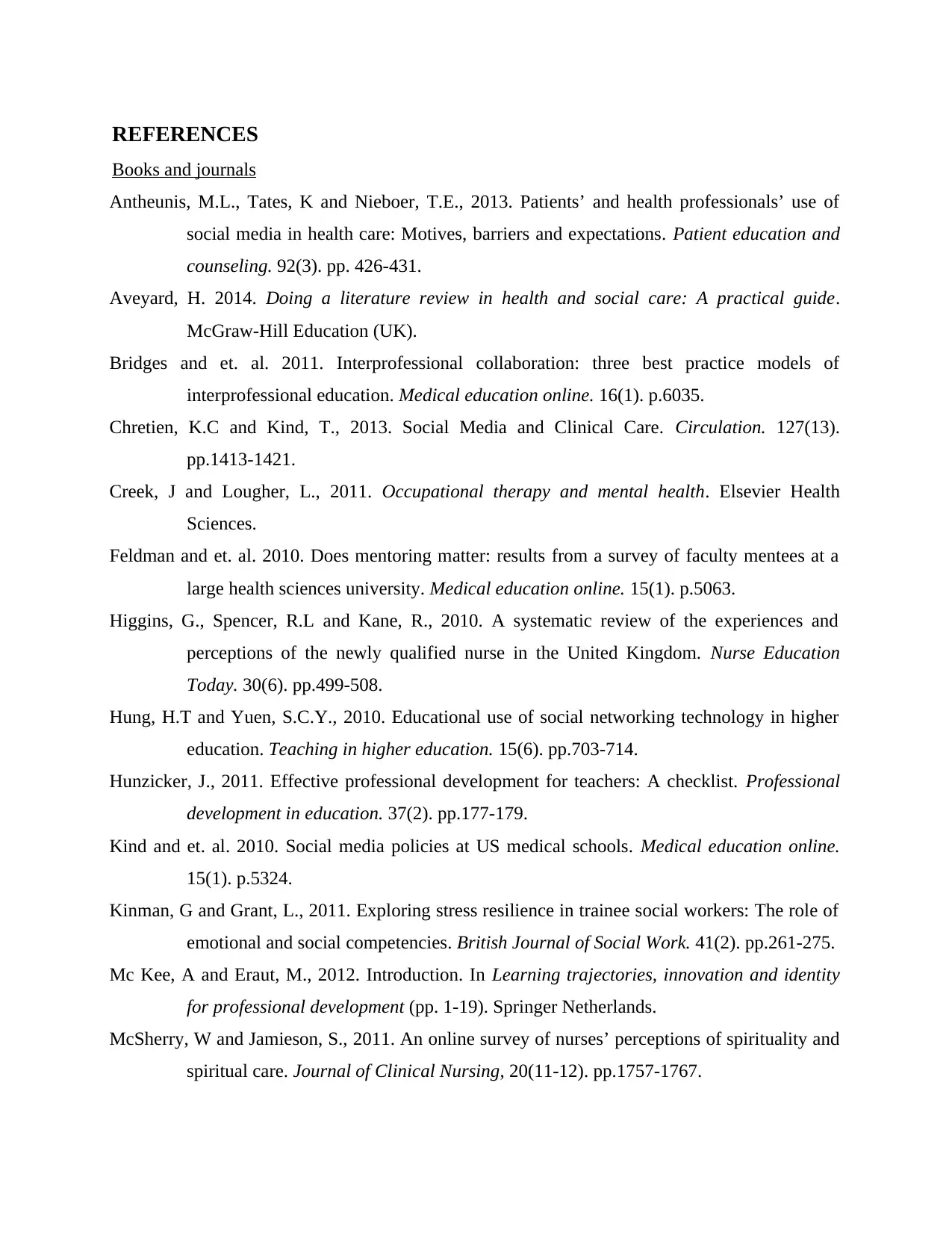
REFERENCES
Books and journals
Antheunis, M.L., Tates, K and Nieboer, T.E., 2013. Patients’ and health professionals’ use of
social media in health care: Motives, barriers and expectations. Patient education and
counseling. 92(3). pp. 426-431.
Aveyard, H. 2014. Doing a literature review in health and social care: A practical guide.
McGraw-Hill Education (UK).
Bridges and et. al. 2011. Interprofessional collaboration: three best practice models of
interprofessional education. Medical education online. 16(1). p.6035.
Chretien, K.C and Kind, T., 2013. Social Media and Clinical Care. Circulation. 127(13).
pp.1413-1421.
Creek, J and Lougher, L., 2011. Occupational therapy and mental health. Elsevier Health
Sciences.
Feldman and et. al. 2010. Does mentoring matter: results from a survey of faculty mentees at a
large health sciences university. Medical education online. 15(1). p.5063.
Higgins, G., Spencer, R.L and Kane, R., 2010. A systematic review of the experiences and
perceptions of the newly qualified nurse in the United Kingdom. Nurse Education
Today. 30(6). pp.499-508.
Hung, H.T and Yuen, S.C.Y., 2010. Educational use of social networking technology in higher
education. Teaching in higher education. 15(6). pp.703-714.
Hunzicker, J., 2011. Effective professional development for teachers: A checklist. Professional
development in education. 37(2). pp.177-179.
Kind and et. al. 2010. Social media policies at US medical schools. Medical education online.
15(1). p.5324.
Kinman, G and Grant, L., 2011. Exploring stress resilience in trainee social workers: The role of
emotional and social competencies. British Journal of Social Work. 41(2). pp.261-275.
Mc Kee, A and Eraut, M., 2012. Introduction. In Learning trajectories, innovation and identity
for professional development (pp. 1-19). Springer Netherlands.
McSherry, W and Jamieson, S., 2011. An online survey of nurses’ perceptions of spirituality and
spiritual care. Journal of Clinical Nursing, 20(11‐12). pp.1757-1767.
Books and journals
Antheunis, M.L., Tates, K and Nieboer, T.E., 2013. Patients’ and health professionals’ use of
social media in health care: Motives, barriers and expectations. Patient education and
counseling. 92(3). pp. 426-431.
Aveyard, H. 2014. Doing a literature review in health and social care: A practical guide.
McGraw-Hill Education (UK).
Bridges and et. al. 2011. Interprofessional collaboration: three best practice models of
interprofessional education. Medical education online. 16(1). p.6035.
Chretien, K.C and Kind, T., 2013. Social Media and Clinical Care. Circulation. 127(13).
pp.1413-1421.
Creek, J and Lougher, L., 2011. Occupational therapy and mental health. Elsevier Health
Sciences.
Feldman and et. al. 2010. Does mentoring matter: results from a survey of faculty mentees at a
large health sciences university. Medical education online. 15(1). p.5063.
Higgins, G., Spencer, R.L and Kane, R., 2010. A systematic review of the experiences and
perceptions of the newly qualified nurse in the United Kingdom. Nurse Education
Today. 30(6). pp.499-508.
Hung, H.T and Yuen, S.C.Y., 2010. Educational use of social networking technology in higher
education. Teaching in higher education. 15(6). pp.703-714.
Hunzicker, J., 2011. Effective professional development for teachers: A checklist. Professional
development in education. 37(2). pp.177-179.
Kind and et. al. 2010. Social media policies at US medical schools. Medical education online.
15(1). p.5324.
Kinman, G and Grant, L., 2011. Exploring stress resilience in trainee social workers: The role of
emotional and social competencies. British Journal of Social Work. 41(2). pp.261-275.
Mc Kee, A and Eraut, M., 2012. Introduction. In Learning trajectories, innovation and identity
for professional development (pp. 1-19). Springer Netherlands.
McSherry, W and Jamieson, S., 2011. An online survey of nurses’ perceptions of spirituality and
spiritual care. Journal of Clinical Nursing, 20(11‐12). pp.1757-1767.
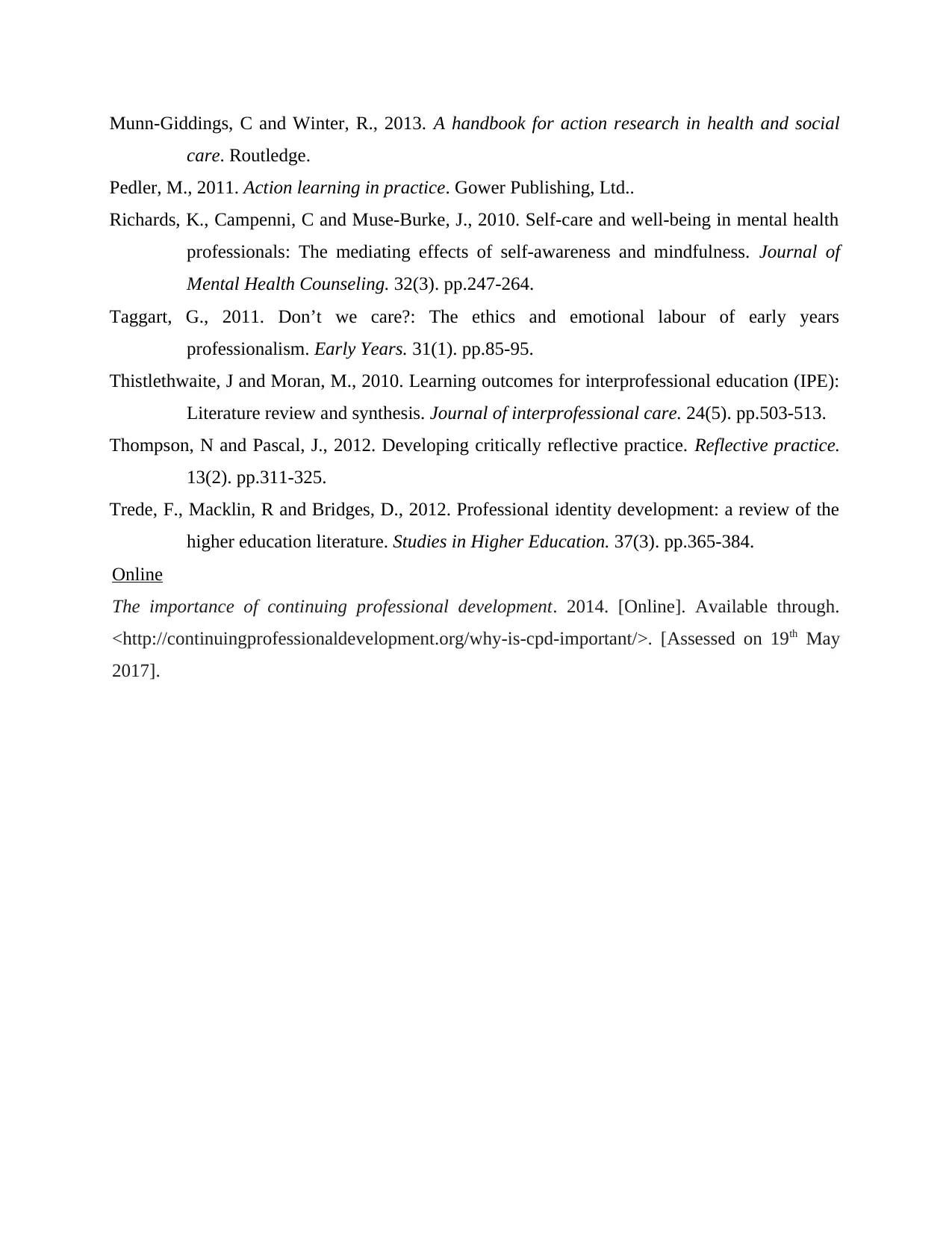
Munn-Giddings, C and Winter, R., 2013. A handbook for action research in health and social
care. Routledge.
Pedler, M., 2011. Action learning in practice. Gower Publishing, Ltd..
Richards, K., Campenni, C and Muse-Burke, J., 2010. Self-care and well-being in mental health
professionals: The mediating effects of self-awareness and mindfulness. Journal of
Mental Health Counseling. 32(3). pp.247-264.
Taggart, G., 2011. Don’t we care?: The ethics and emotional labour of early years
professionalism. Early Years. 31(1). pp.85-95.
Thistlethwaite, J and Moran, M., 2010. Learning outcomes for interprofessional education (IPE):
Literature review and synthesis. Journal of interprofessional care. 24(5). pp.503-513.
Thompson, N and Pascal, J., 2012. Developing critically reflective practice. Reflective practice.
13(2). pp.311-325.
Trede, F., Macklin, R and Bridges, D., 2012. Professional identity development: a review of the
higher education literature. Studies in Higher Education. 37(3). pp.365-384.
Online
The importance of continuing professional development. 2014. [Online]. Available through.
<http://continuingprofessionaldevelopment.org/why-is-cpd-important/>. [Assessed on 19th May
2017].
care. Routledge.
Pedler, M., 2011. Action learning in practice. Gower Publishing, Ltd..
Richards, K., Campenni, C and Muse-Burke, J., 2010. Self-care and well-being in mental health
professionals: The mediating effects of self-awareness and mindfulness. Journal of
Mental Health Counseling. 32(3). pp.247-264.
Taggart, G., 2011. Don’t we care?: The ethics and emotional labour of early years
professionalism. Early Years. 31(1). pp.85-95.
Thistlethwaite, J and Moran, M., 2010. Learning outcomes for interprofessional education (IPE):
Literature review and synthesis. Journal of interprofessional care. 24(5). pp.503-513.
Thompson, N and Pascal, J., 2012. Developing critically reflective practice. Reflective practice.
13(2). pp.311-325.
Trede, F., Macklin, R and Bridges, D., 2012. Professional identity development: a review of the
higher education literature. Studies in Higher Education. 37(3). pp.365-384.
Online
The importance of continuing professional development. 2014. [Online]. Available through.
<http://continuingprofessionaldevelopment.org/why-is-cpd-important/>. [Assessed on 19th May
2017].
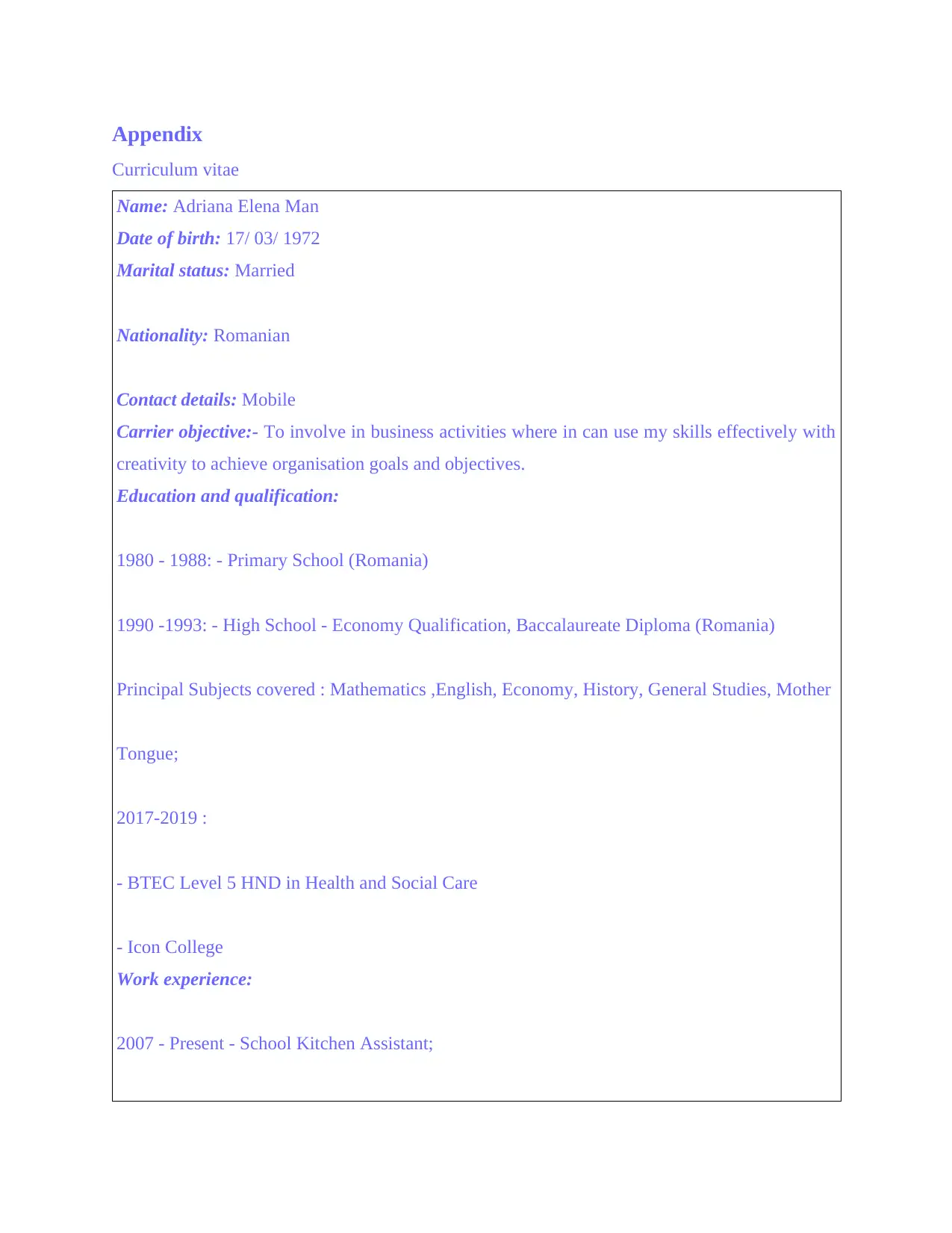
Appendix
Curriculum vitae
Name: Adriana Elena Man
Date of birth: 17/ 03/ 1972
Marital status: Married
Nationality: Romanian
Contact details: Mobile
Carrier objective:- To involve in business activities where in can use my skills effectively with
creativity to achieve organisation goals and objectives.
Education and qualification:
1980 - 1988: - Primary School (Romania)
1990 -1993: - High School - Economy Qualification, Baccalaureate Diploma (Romania)
Principal Subjects covered : Mathematics ,English, Economy, History, General Studies, Mother
Tongue;
2017-2019 :
- BTEC Level 5 HND in Health and Social Care
- Icon College
Work experience:
2007 - Present - School Kitchen Assistant;
Curriculum vitae
Name: Adriana Elena Man
Date of birth: 17/ 03/ 1972
Marital status: Married
Nationality: Romanian
Contact details: Mobile
Carrier objective:- To involve in business activities where in can use my skills effectively with
creativity to achieve organisation goals and objectives.
Education and qualification:
1980 - 1988: - Primary School (Romania)
1990 -1993: - High School - Economy Qualification, Baccalaureate Diploma (Romania)
Principal Subjects covered : Mathematics ,English, Economy, History, General Studies, Mother
Tongue;
2017-2019 :
- BTEC Level 5 HND in Health and Social Care
- Icon College
Work experience:
2007 - Present - School Kitchen Assistant;
Paraphrase This Document
Need a fresh take? Get an instant paraphrase of this document with our AI Paraphraser
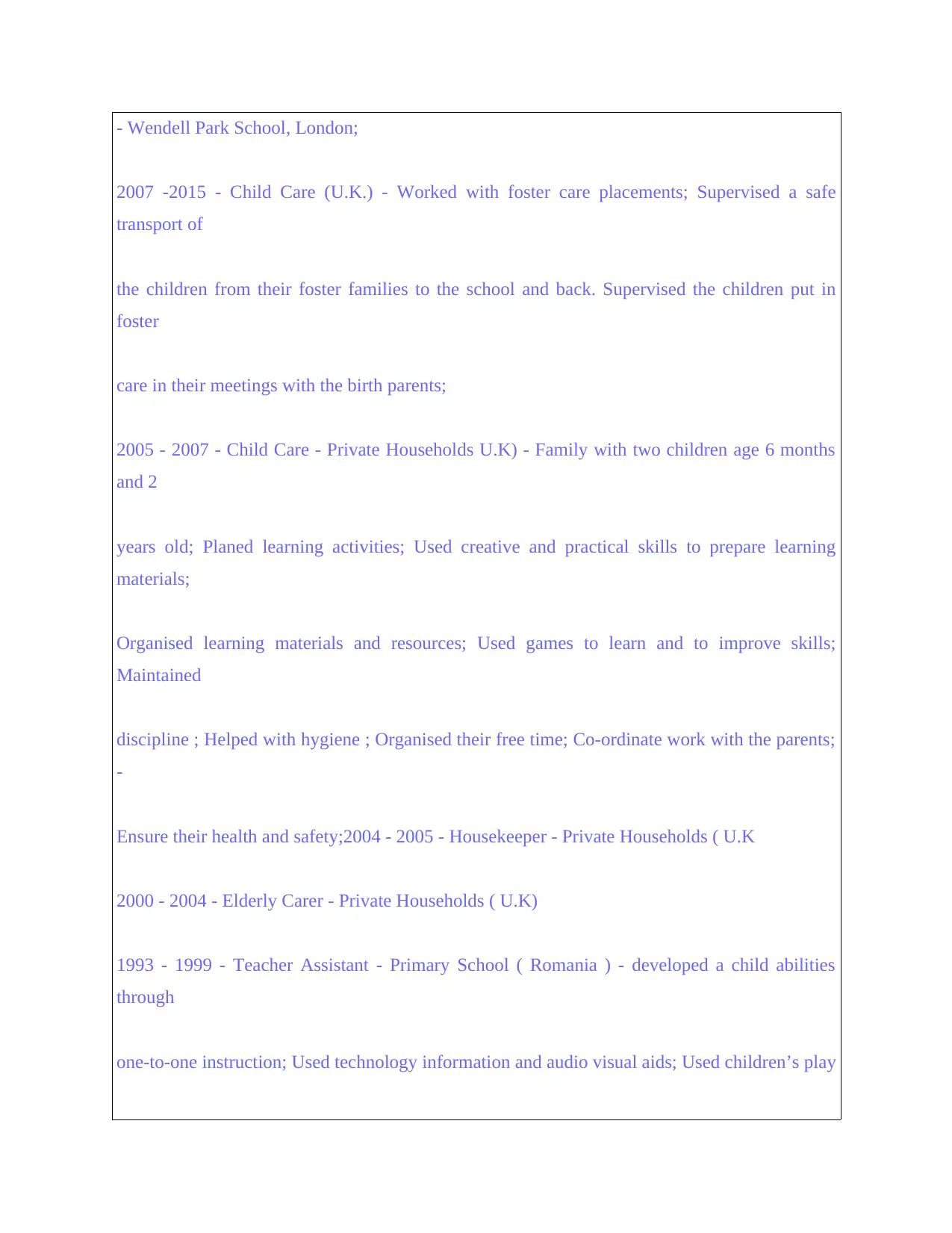
- Wendell Park School, London;
2007 -2015 - Child Care (U.K.) - Worked with foster care placements; Supervised a safe
transport of
the children from their foster families to the school and back. Supervised the children put in
foster
care in their meetings with the birth parents;
2005 - 2007 - Child Care - Private Households U.K) - Family with two children age 6 months
and 2
years old; Planed learning activities; Used creative and practical skills to prepare learning
materials;
Organised learning materials and resources; Used games to learn and to improve skills;
Maintained
discipline ; Helped with hygiene ; Organised their free time; Co-ordinate work with the parents;
-
Ensure their health and safety;2004 - 2005 - Housekeeper - Private Households ( U.K
2000 - 2004 - Elderly Carer - Private Households ( U.K)
1993 - 1999 - Teacher Assistant - Primary School ( Romania ) - developed a child abilities
through
one-to-one instruction; Used technology information and audio visual aids; Used children’s play
2007 -2015 - Child Care (U.K.) - Worked with foster care placements; Supervised a safe
transport of
the children from their foster families to the school and back. Supervised the children put in
foster
care in their meetings with the birth parents;
2005 - 2007 - Child Care - Private Households U.K) - Family with two children age 6 months
and 2
years old; Planed learning activities; Used creative and practical skills to prepare learning
materials;
Organised learning materials and resources; Used games to learn and to improve skills;
Maintained
discipline ; Helped with hygiene ; Organised their free time; Co-ordinate work with the parents;
-
Ensure their health and safety;2004 - 2005 - Housekeeper - Private Households ( U.K
2000 - 2004 - Elderly Carer - Private Households ( U.K)
1993 - 1999 - Teacher Assistant - Primary School ( Romania ) - developed a child abilities
through
one-to-one instruction; Used technology information and audio visual aids; Used children’s play
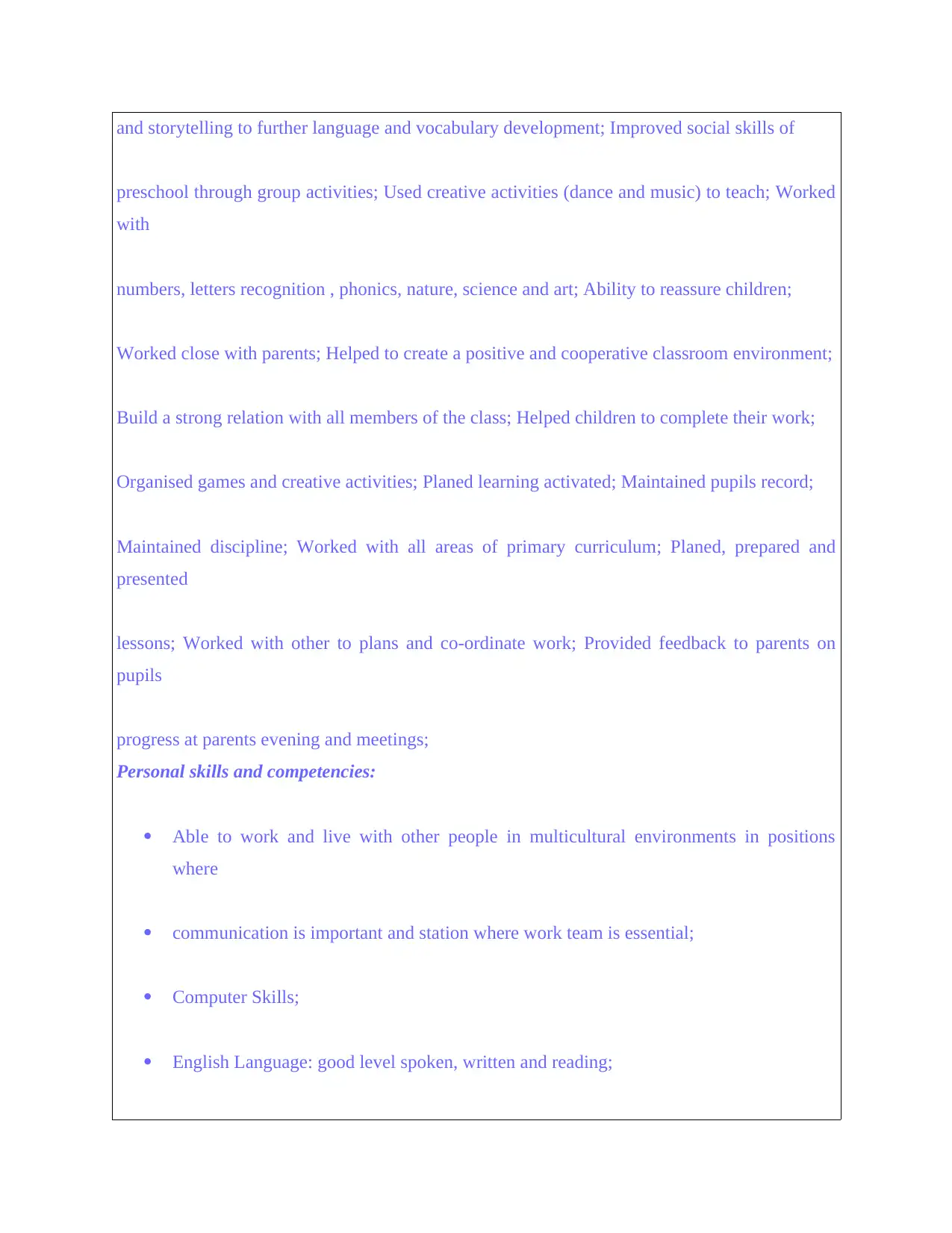
and storytelling to further language and vocabulary development; Improved social skills of
preschool through group activities; Used creative activities (dance and music) to teach; Worked
with
numbers, letters recognition , phonics, nature, science and art; Ability to reassure children;
Worked close with parents; Helped to create a positive and cooperative classroom environment;
Build a strong relation with all members of the class; Helped children to complete their work;
Organised games and creative activities; Planed learning activated; Maintained pupils record;
Maintained discipline; Worked with all areas of primary curriculum; Planed, prepared and
presented
lessons; Worked with other to plans and co-ordinate work; Provided feedback to parents on
pupils
progress at parents evening and meetings;
Personal skills and competencies:
Able to work and live with other people in multicultural environments in positions
where
communication is important and station where work team is essential;
Computer Skills;
English Language: good level spoken, written and reading;
preschool through group activities; Used creative activities (dance and music) to teach; Worked
with
numbers, letters recognition , phonics, nature, science and art; Ability to reassure children;
Worked close with parents; Helped to create a positive and cooperative classroom environment;
Build a strong relation with all members of the class; Helped children to complete their work;
Organised games and creative activities; Planed learning activated; Maintained pupils record;
Maintained discipline; Worked with all areas of primary curriculum; Planed, prepared and
presented
lessons; Worked with other to plans and co-ordinate work; Provided feedback to parents on
pupils
progress at parents evening and meetings;
Personal skills and competencies:
Able to work and live with other people in multicultural environments in positions
where
communication is important and station where work team is essential;
Computer Skills;
English Language: good level spoken, written and reading;
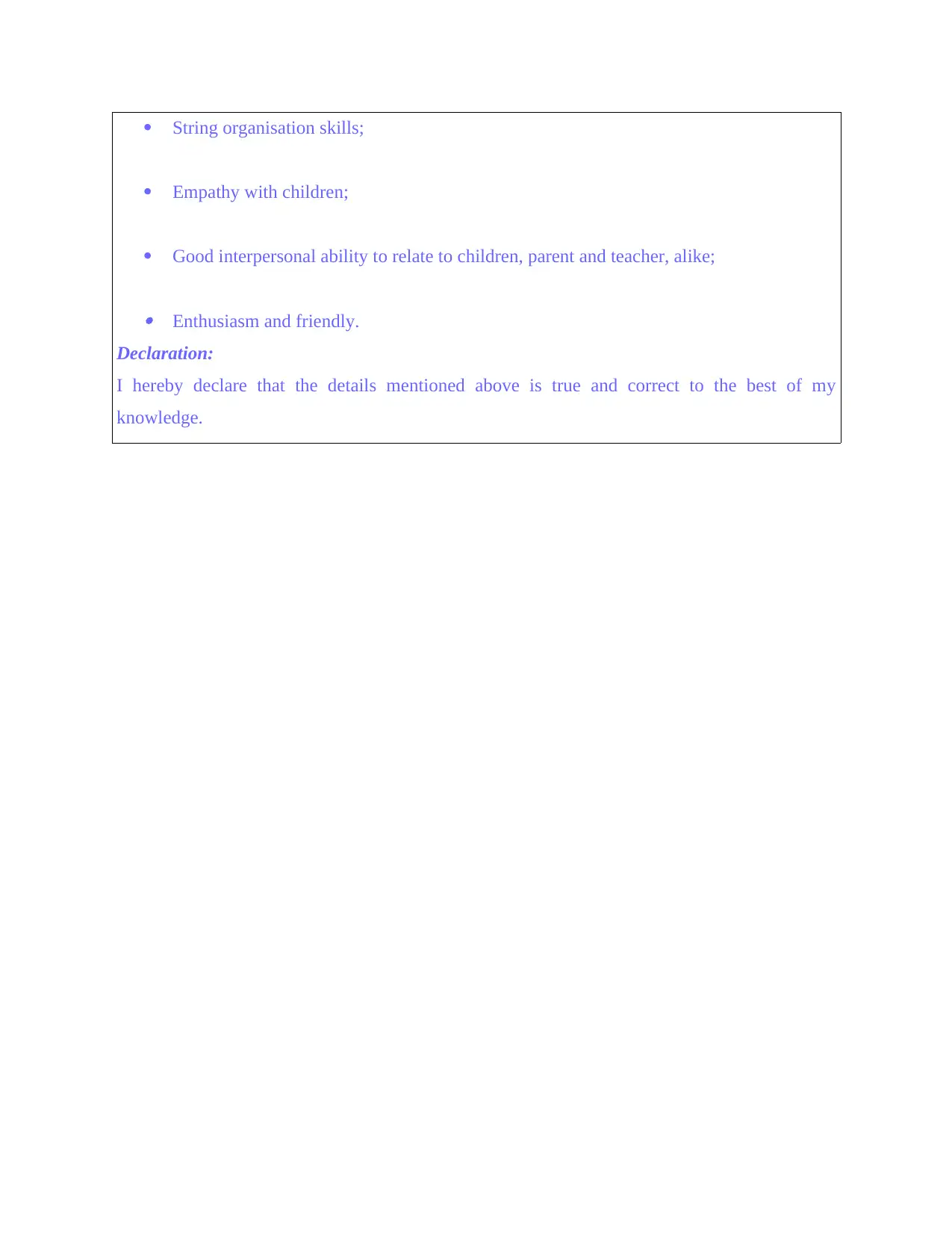
String organisation skills;
Empathy with children;
Good interpersonal ability to relate to children, parent and teacher, alike;
Enthusiasm and friendly.
Declaration:
I hereby declare that the details mentioned above is true and correct to the best of my
knowledge.
Empathy with children;
Good interpersonal ability to relate to children, parent and teacher, alike;
Enthusiasm and friendly.
Declaration:
I hereby declare that the details mentioned above is true and correct to the best of my
knowledge.
1 out of 22
Related Documents
Your All-in-One AI-Powered Toolkit for Academic Success.
+13062052269
info@desklib.com
Available 24*7 on WhatsApp / Email
![[object Object]](/_next/static/media/star-bottom.7253800d.svg)
Unlock your academic potential
© 2024 | Zucol Services PVT LTD | All rights reserved.





